A curated selection of Japanese proverbs (kotowaza) to provide a source of comfort and clarity on one’s life journey.
For a long time, I’ve been drawn to Japan – not by the neon lights of Tokyo or the worlds of anime, but by something deeper. My fascination was with the quiet dignity in a raked zen garden, the philosophy of finding beauty in imperfection (wabi-sabi), and the sense of intention in everything from a tea ceremony to a simple, handcrafted bowl.
This desire to understand the heart of the culture led me on a journey to learn the Japanese language, where I happened to stumble upon kotowaza – Japanese proverbs. These words of wisdom, passed down through generations, offer a glimpse into a side of Japan not typically portrayed on social media. From time to time, they have provided me with a source of comfort and helped light my own path of self-discovery.
Highlights
- The collection of proverbs below touches upon a variety of themes related to the human experience – from the transient beauty of life’s journey to the quiet strength found in resilience, the complexities of our relationships, and the humble spirit of lifelong learning.
- These words are intended to serve as an anchor in difficult times, a guide for self-reflection, and a connection to a philosophy that values patience, mindfulness, and the beauty of the everyday.
What are Japanese Proverbs?
In Japan, there is an ancient belief called 言霊 (kotodama) – the idea that words themselves hold a spiritual power and, if spoken with intention and sincerity, can shape reality and touch the soul. That belief is expressed vividly in the world of kotowaza (ことわざ).
While kotowaza is typically translated as “proverb”, the term is a rich umbrella for centuries of distilled wisdom. These are not just phrases; they are nuggets of truth, born from the experiences of farmers, monks, samurai, and everyday people. They have diverse origins – some spring from Buddhist teachings, others from ancient Chinese classics, and many from the simple, yet deep observation of daily life and nature.
Generally speaking, Japanese proverbs are divided into 3 main types as follows:
- Short sayings (言い習わし, iinarawashi): These are the most common type of proverb, capturing a simple truth in a memorable phrase. A classic example is 猿も木から落ちる (Saru mo ki kara ochiru), or “Even monkeys fall from trees”.
- Idiomatic phrases (慣用句, kan’yōku): Like idioms in English, the meaning of these phrases isn’t literal. They add colour and emotion to the language. For instance, someone who is incredibly busy might say they’re so swamped they want to 猫の手も借りたい (neko no te mo karitai), or “borrow even a cat’s paw.”
- Four-character idioms (四字熟語, yojijukugo): These are elegant, concise, and deeply poetic phrases composed of four Kanji characters. Many originate from Buddhist scriptures and Chinese philosophy. An example is 一期一会 (Ichi-go ichi-e), or “one-time, one-meeting”.

Japanese Proverbs about Life’s Journey
一期一会 (Ichi-go ichi-e)
Literal meaning: “One time, one meeting.”
Every gathering, every conversation, every shared cup of tea is a unique event that will never happen in the same way again. As such, we should be fully present, recognizing the fleeting beauty of each encounter, both with others and with the world around us.
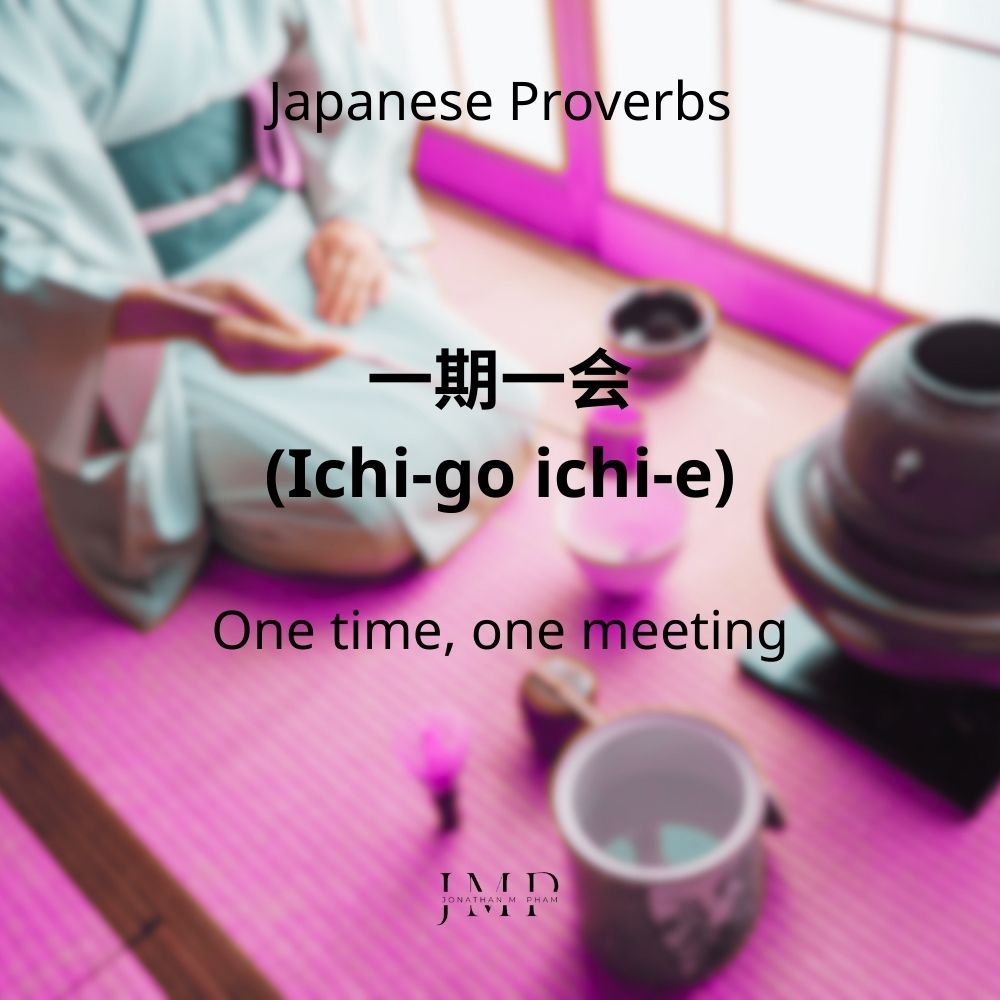
Short Japanese proverbs about life
人生谷あり山あり (Jinsei tani ari yama ari)
Literal meaning: “Life has its valleys and its mountains.”
There will be periods of struggle and ease, sorrow and joy in life. Acknowledging this natural flow allows one to cultivate resilience, realizing that no “valley” is permanent – and that every “mountain peak” they reach was once a distant goal.
Read more: 85 Embracing Change Quotes – Thriving in Transformation
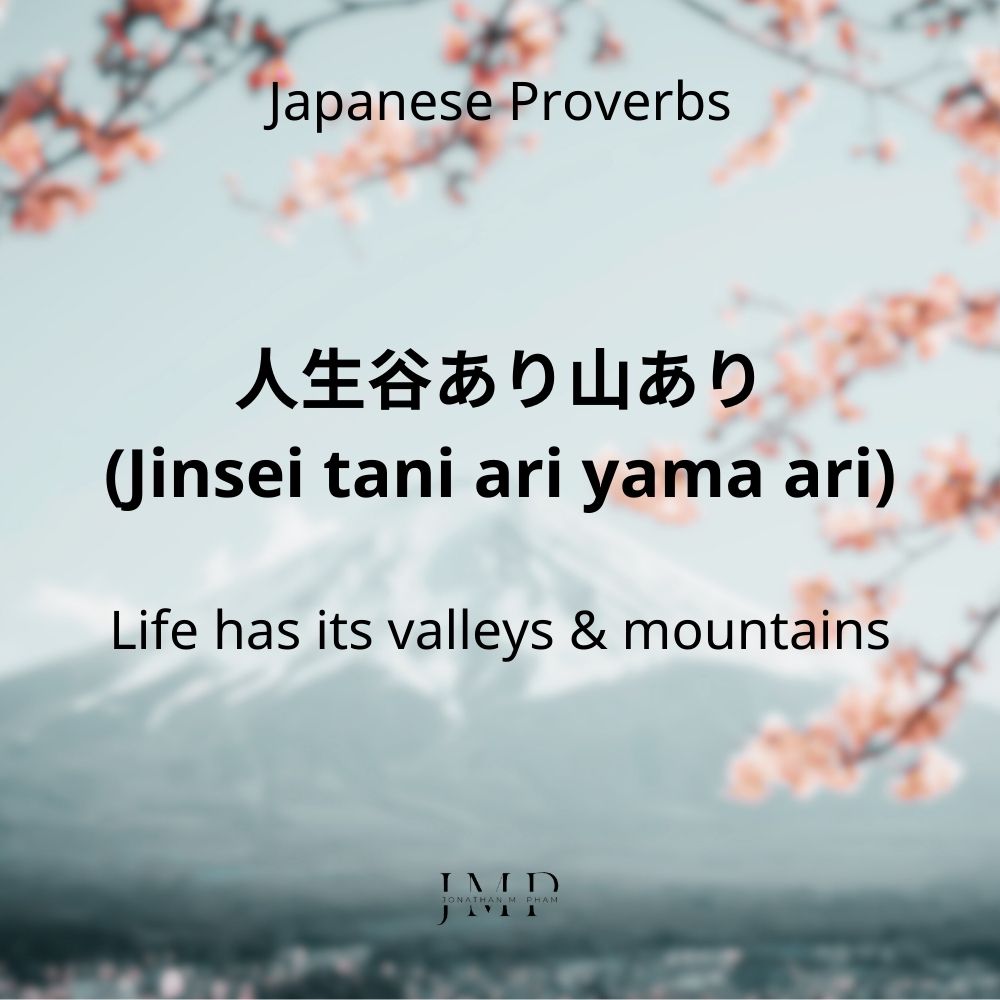
Japanese proverbs about change
雨降って地固まる (Ame futte ji katamaru)
Literal meaning: “After the rain, the ground hardens.”
Adversity, like a downpour, may seem unsettling. Yet, after the storm passes, many of us find ourselves stronger, more resilient, and standing on firmer ground than before. Challenges have a way of compacting our foundation, revealing a strength we didn’t know we possessed.
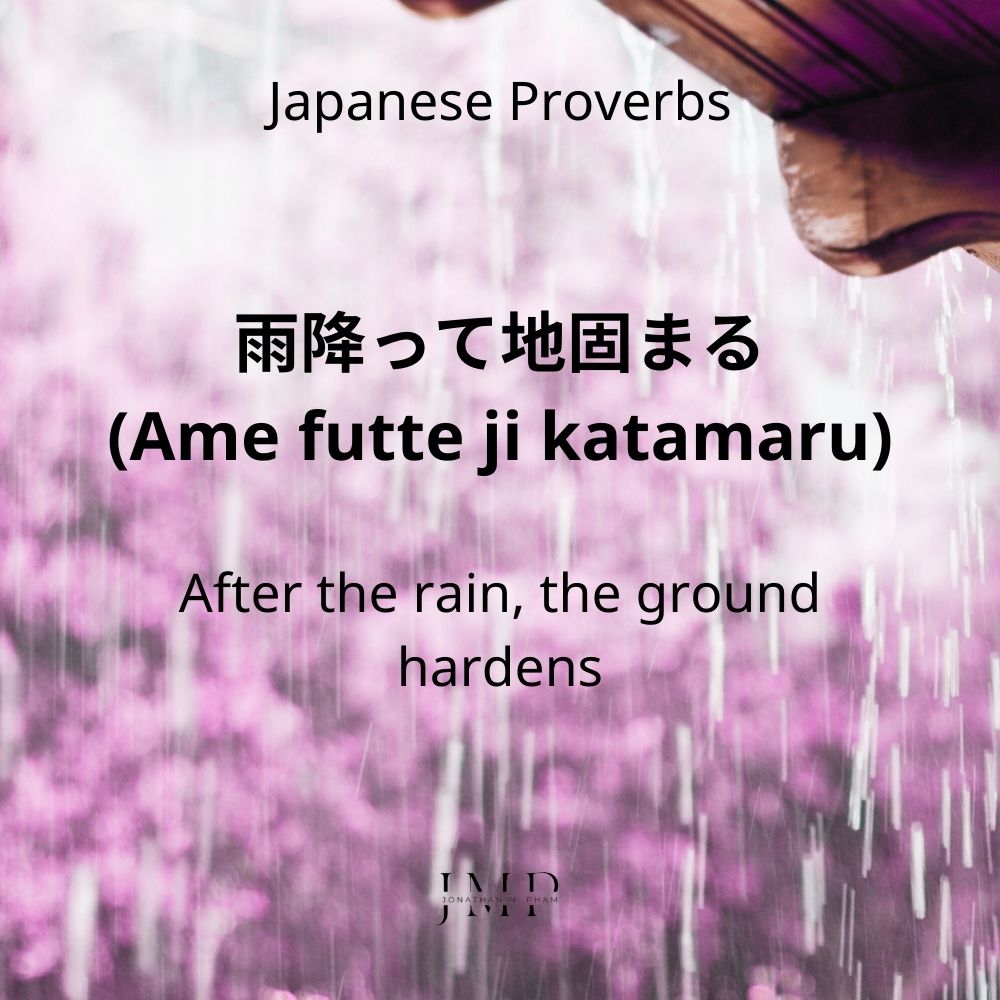
花鳥風月 (Kachou fuugetsu)
Literal meaning: “Flower, Bird, Wind, Moon.”
These four characters represent the traditional beauties of nature, and together, they symbolize the importance of experiencing the world through a mindful, appreciative lens. It’s an invitation to step away from worries and immerse oneself in the simple, elegant beauty that is always present.
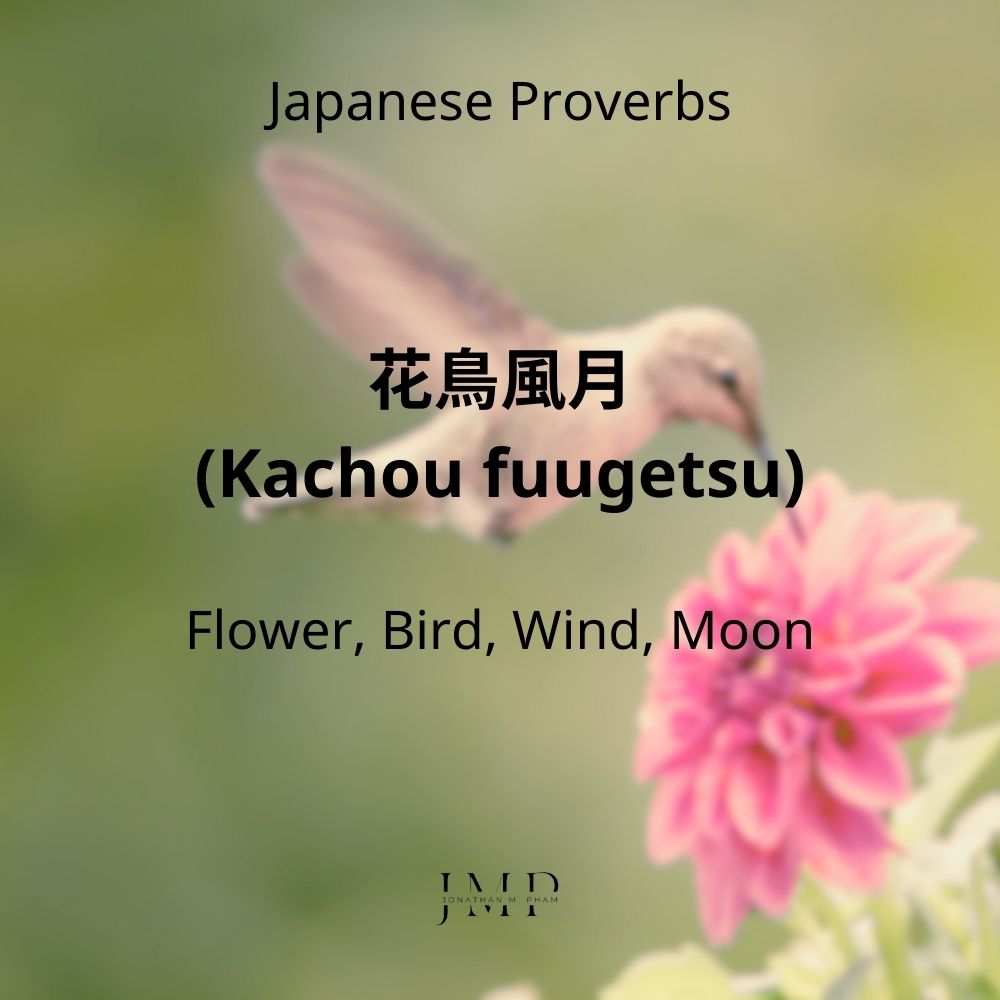
Japanese proverbs about beauty
明日は明日の風が吹く (Ashita wa ashita no kaze ga fuku)
Literal meaning: “Tomorrow’s wind will blow tomorrow.”
Worrying about the future is like trying to predict the wind – a futile effort. Just face today’s challenges with what you have now, and trust that you will have the strength and resources to meet whatever comes tomorrow.
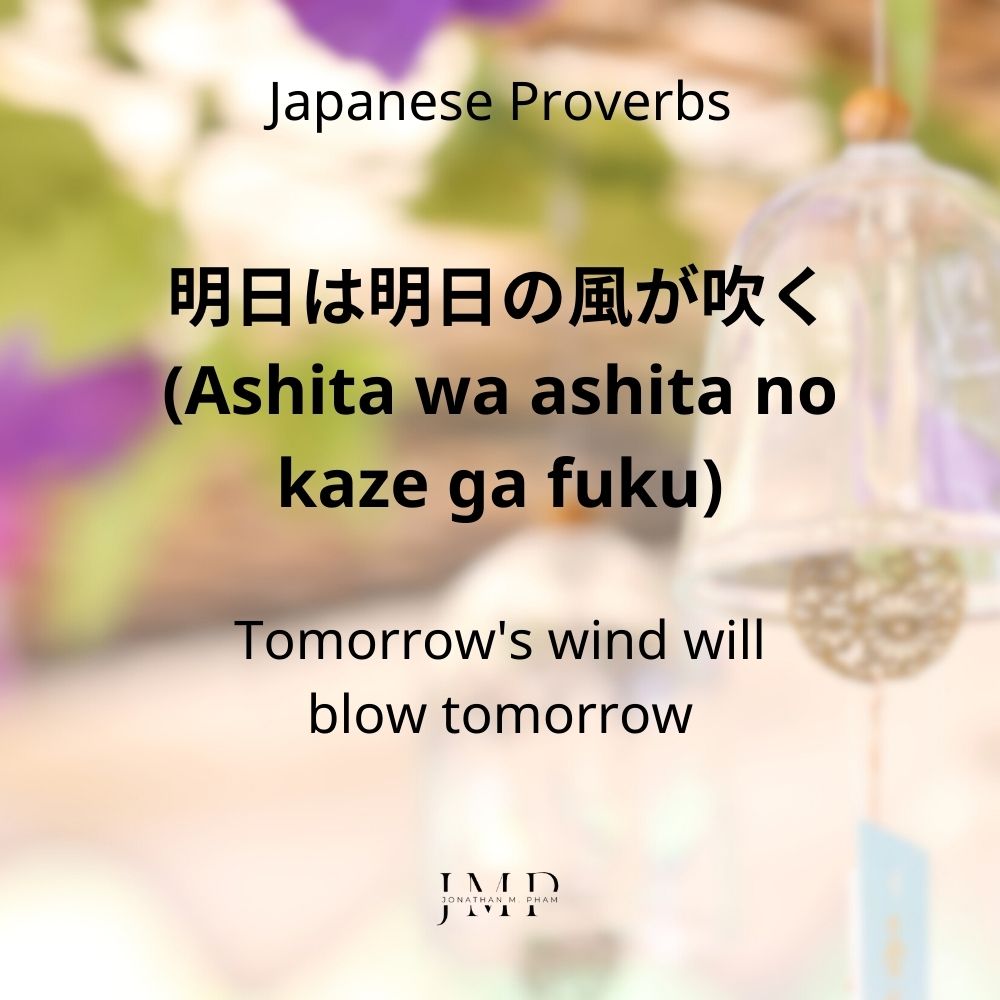
自業自得 (Jigou jitoku)
Literal meaning: “One’s act, one’s gain.”
Here, we are introduced to the law of cause and effect, where one ultimately reaps what one sows. It’s a call for personal accountability, not in a punishing way, but as a reminder that the choices made today, whether in action or inaction, are the seeds of future reality.
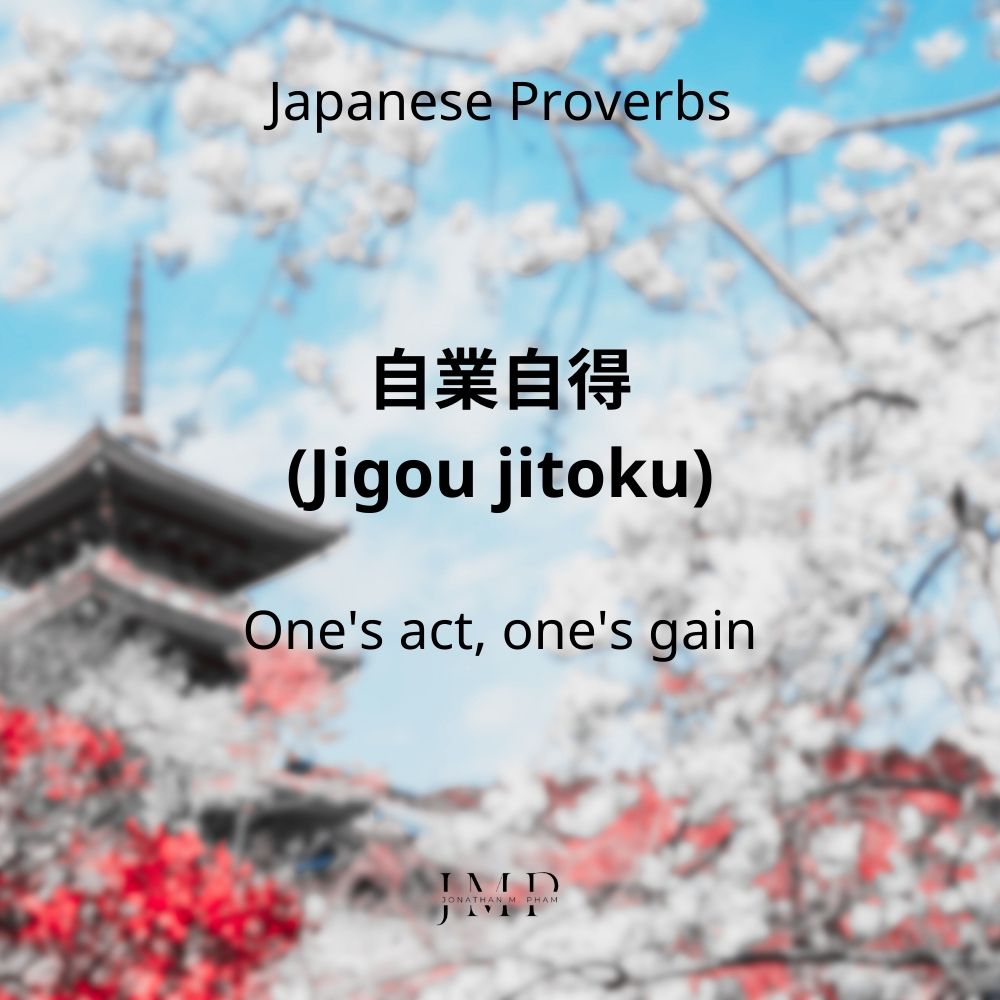
Famous Japanese sayings about life
間違った電車に乗ったら、次の駅で降りなさい (Machigatta densha ni nottara, tsugi no eki de orinasai)
Literal meaning: “If you get on the wrong train, get off at the next station.”
Don’t keep traveling in the wrong direction out of stubbornness or embarrassment. Acknowledge a mistake quickly, correct the course, and minimize the time spent on a path that isn’t yours.
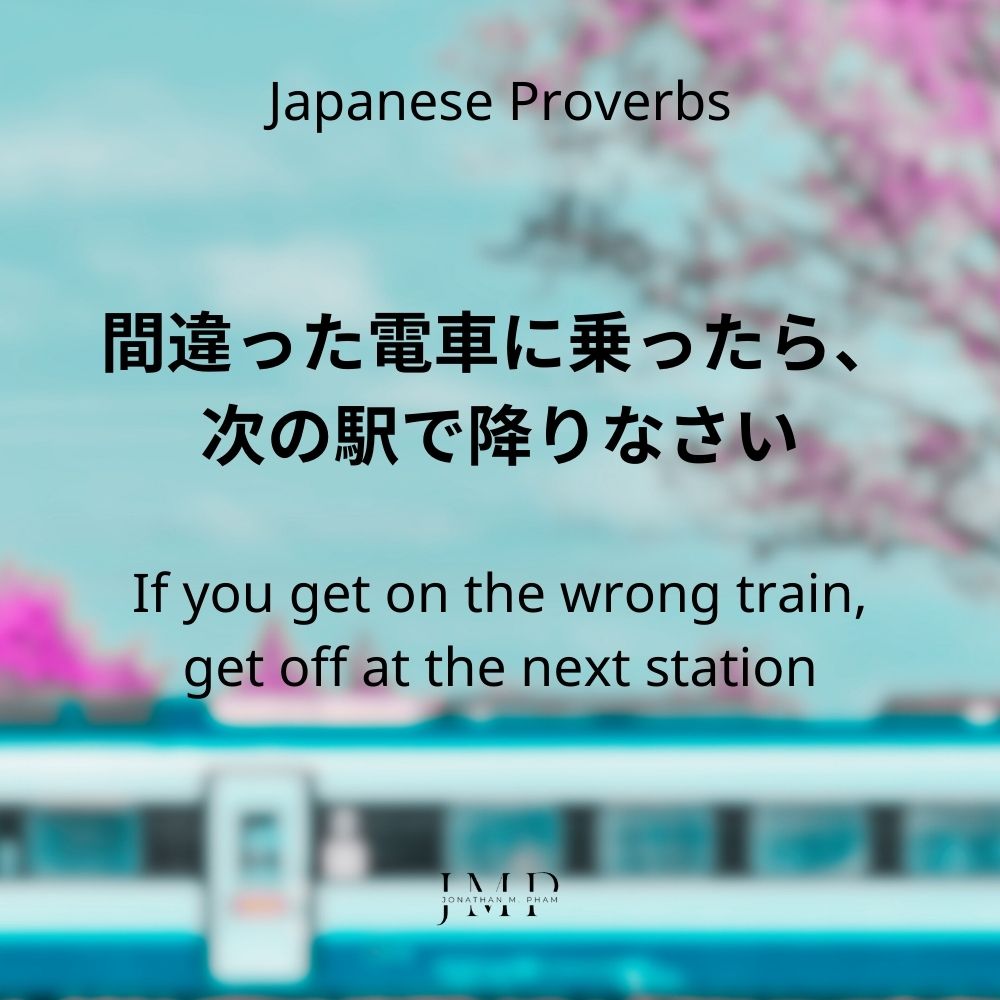
間違えて乗った電車が、時には目的地に連れて行ってくれる (Machigaete notta densha ga, toki ni wa mokutekichi ni tsureteitte kureru)
Literal meaning: “Sometimes, the train you took by mistake takes you to your destination.”
And here, we have a beautiful counterpoint to the previous idea. Not every mistake is a true error. Many times, an unplanned detour, a “wrong turn,” leads to an unexpected discovery or a destination better than the one originally planned. As such, we need to remind ourselves to always remain open to life’s surprising gifts – and to embrace every experience wholeheartedly.

Japanese proverbs about travel
桃栗三年柿八年 (Momo kuri sannen, kaki hachinen)
Literal meaning: “Peaches and chestnuts take three years, persimmons take eight.”
Good things take time. Each goal, each skill, and each stage of growth has its own natural timeline. Rushing the process is like trying to harvest a fruit before it’s ripe. Patience and consistent effort are, therefore, the keys to bearing fruit.
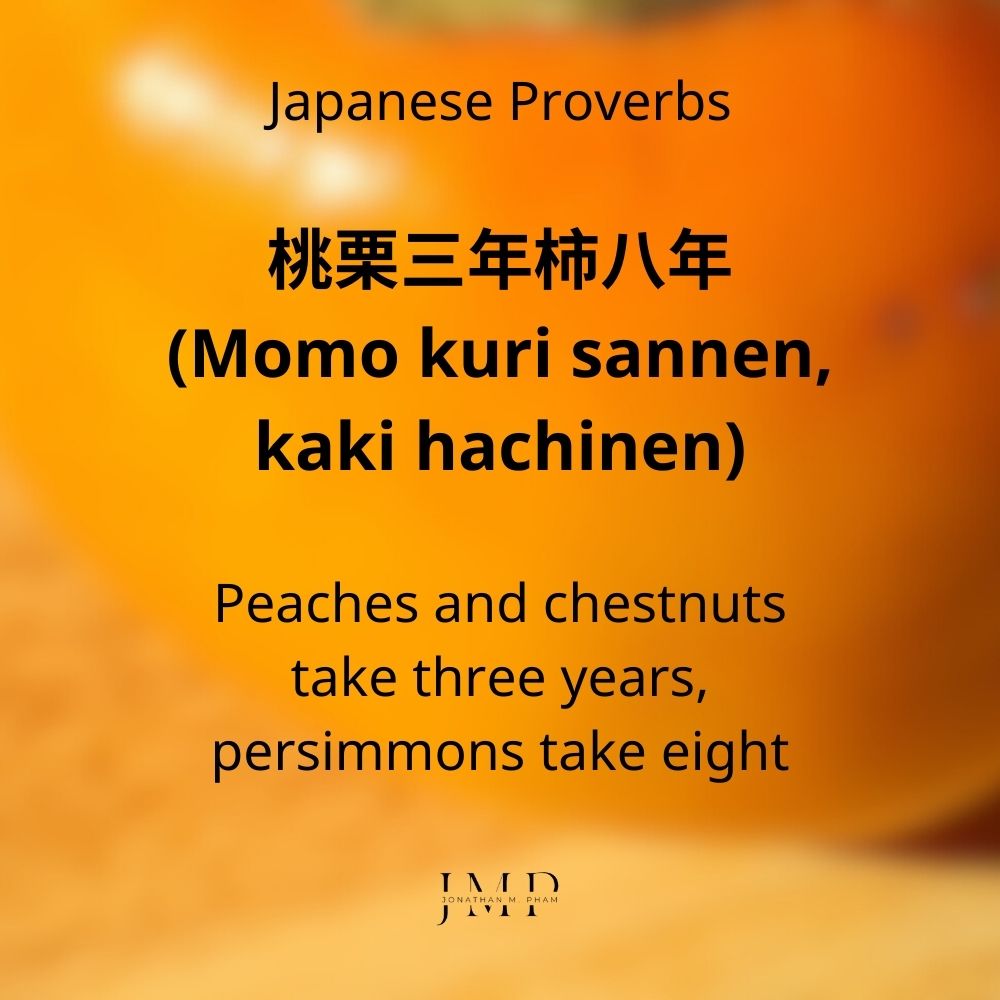
Japanese proverbs about time
生者必滅、会者定離 (Shousha hitsumetsu, esha jouri)
Literal meaning: “Those who are born must die; those who meet must part.”
A core Buddhist teaching on impermanence. Nothing lasts forever – including our own existence. Rather than viewing it as a source of sadness or despair, one may turn this insight into a catalyst for gratitude. Knowing that all things are transient makes the time we have with people and experiences infinitely more precious.
Read more: 72 Memento Mori Quotes – Remember You’re Mortal
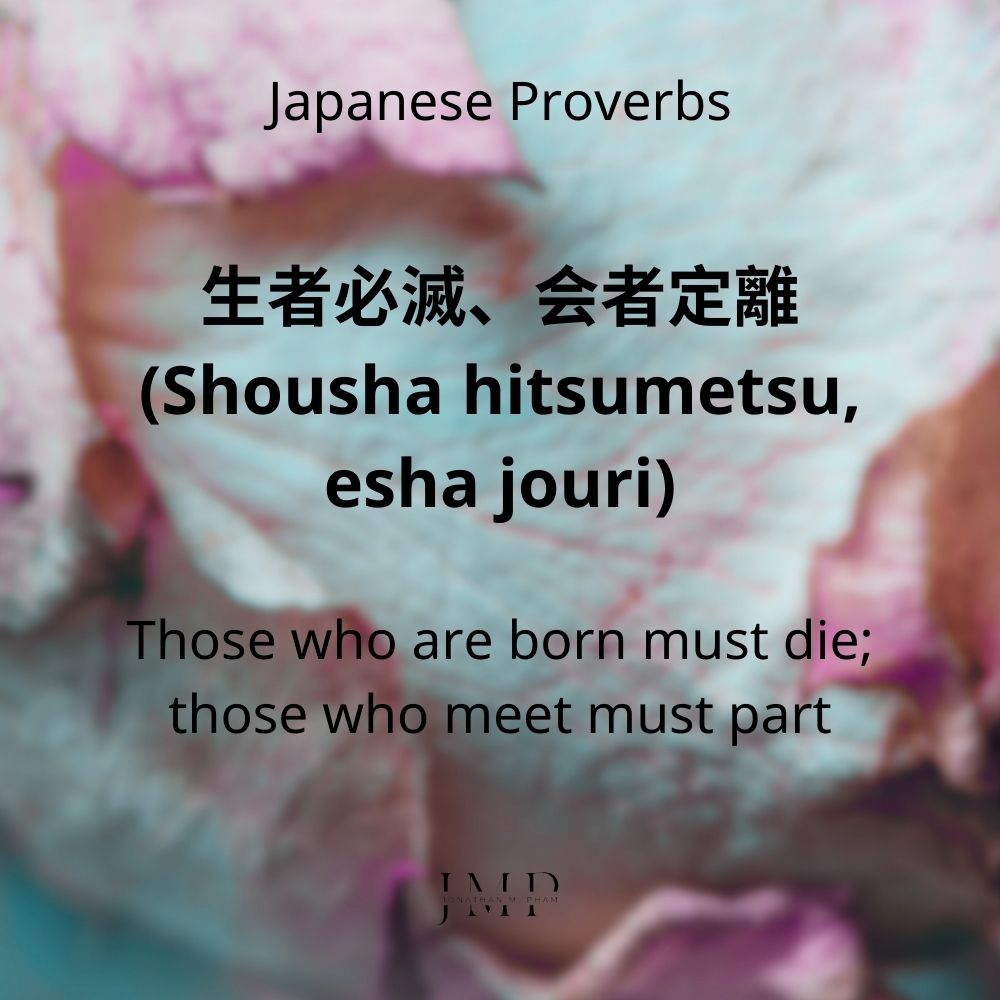
Japanese proverbs about death
Japanese Proverbs about Resilience, Perseverance & Success
猿も木から落ちる (Saru mo ki kara ochiru)
Literal meaning: “Even monkeys fall from trees.”
No one is perfect. Even experts make mistakes in their area of expertise. Forgive yourself for errors – and extend that same grace to others. Failure is not a reflection of worth; it’s just a universal part of the human experience.
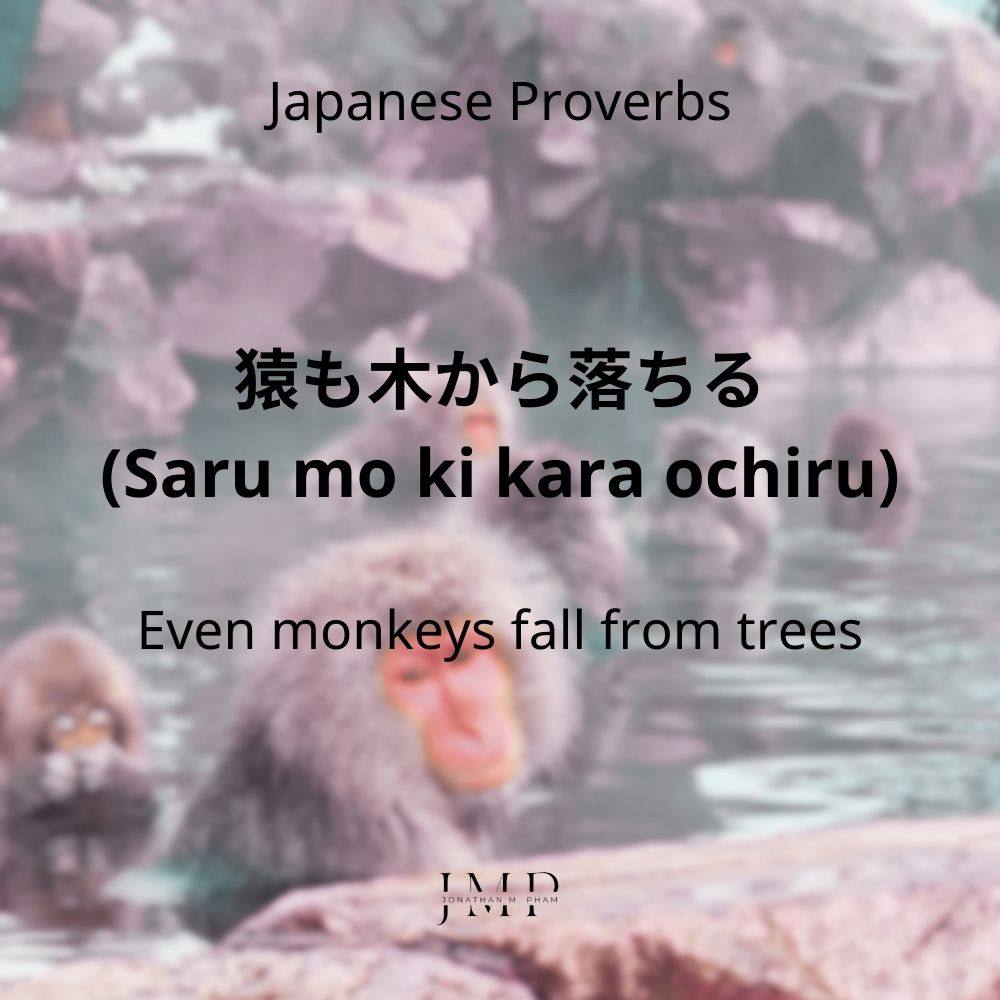
Famous Japanese quotes
覆水盆に返らず (Fukusui bon ni kaerazu)
Literal meaning: “Spilt water will not return to the tray.”
What is done cannot be undone. There is no use in lamenting the past or dwelling on irreversible mistakes. The only path forward is to accept what has happened, learn from it, and focus one’s energy on the present and future.
Read more: Shikata ga nai (仕方がない) – Finding Serenity in Acceptance
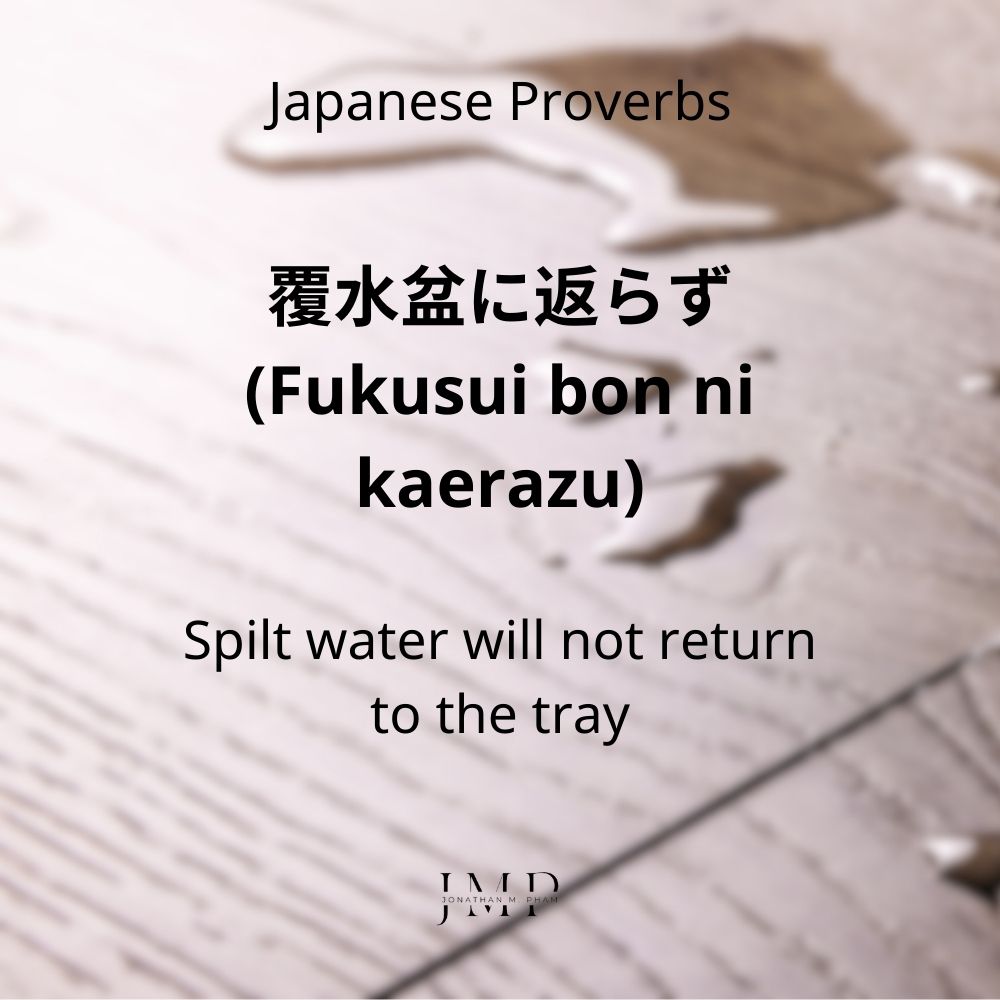
七転び八起き (Nanakorobi yaoki)
Literal meaning: “Fall down seven times, get up eight.”
The number of times you stumble and fail is irrelevant; what matters is the commitment to rise one more time. To refuse to be defeated.
Read more: Gaman (我慢) – The Unspoken Power of Japanese Endurance
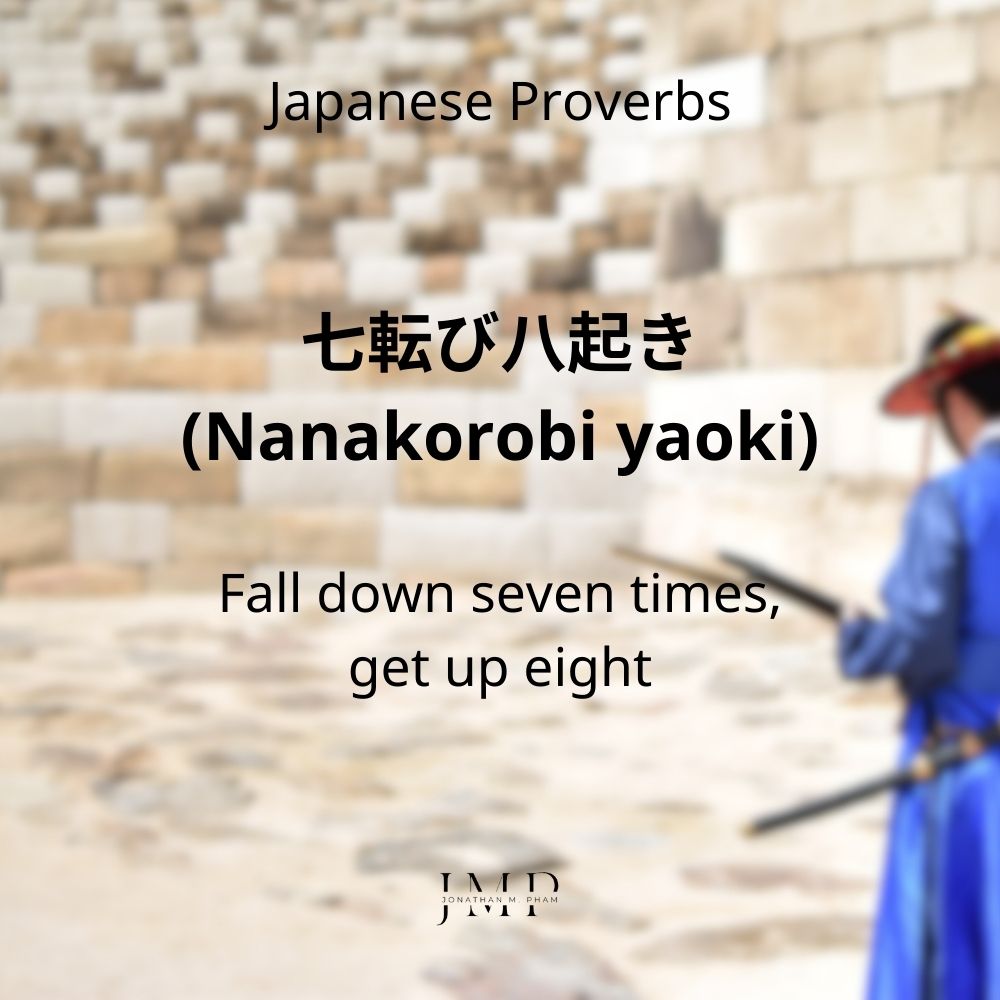
石の上にも三年 (Ishi no ue ni mo sannen)
Literal meaning: “Three years on a stone.”
Patience and perseverance can make anything happen – just like how a cold, hard stone can turn warm if one just keep sitting on it for “three years”. Even when progress seems invisible, one should always stick to the belief that persistent, focused effort will eventually yield results.
Read more: 90 Resilience Quotes – Finding Fortitude in the Storm
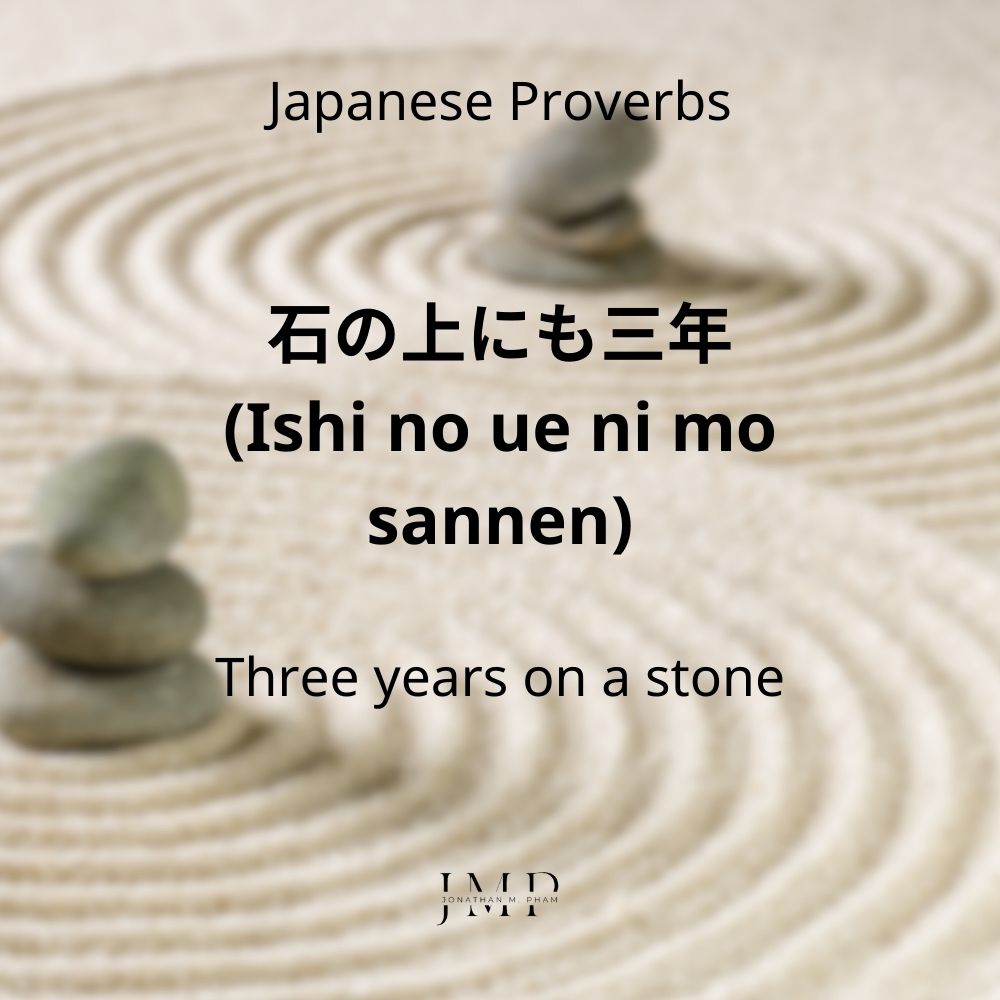
Japanese proverbs about patience
雲外蒼天 (Ungai souten)
Literal meaning: “Blue sky beyond the clouds.”
During difficult times, it’s so tempting to assume that the sky is permanently grey. And yet, above the turbulent clouds of any struggle, a clear, blue sky is still there – waiting. Endure the storm, for clarity and peace will one day return.
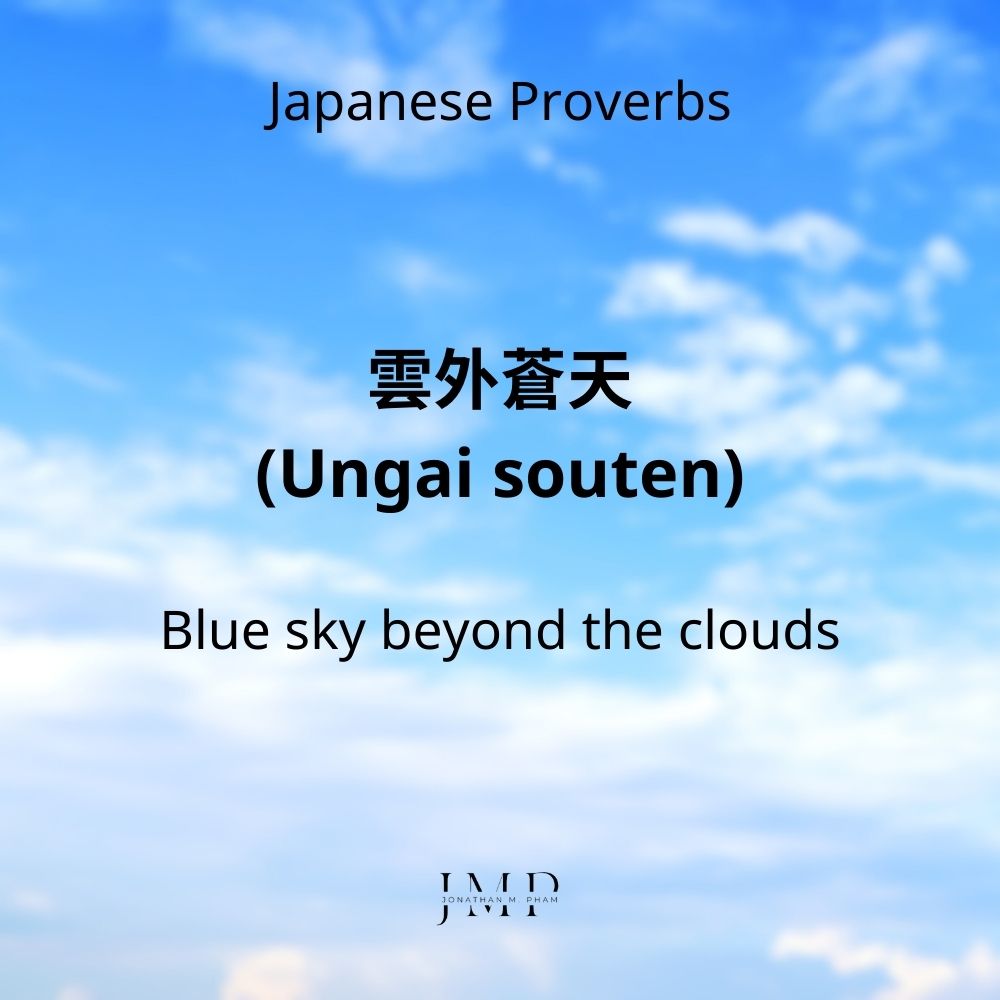
継続は力なり (Keizoku wa chikara nari)
Literal meaning: “Continuation is power.”
True strength isn’t found in a single burst of effort, but in the compounding force of consistency. Small, daily actions, when continued over time, build a momentum that will eventually become an unstoppable force. A little bit every day amounts to a great deal.
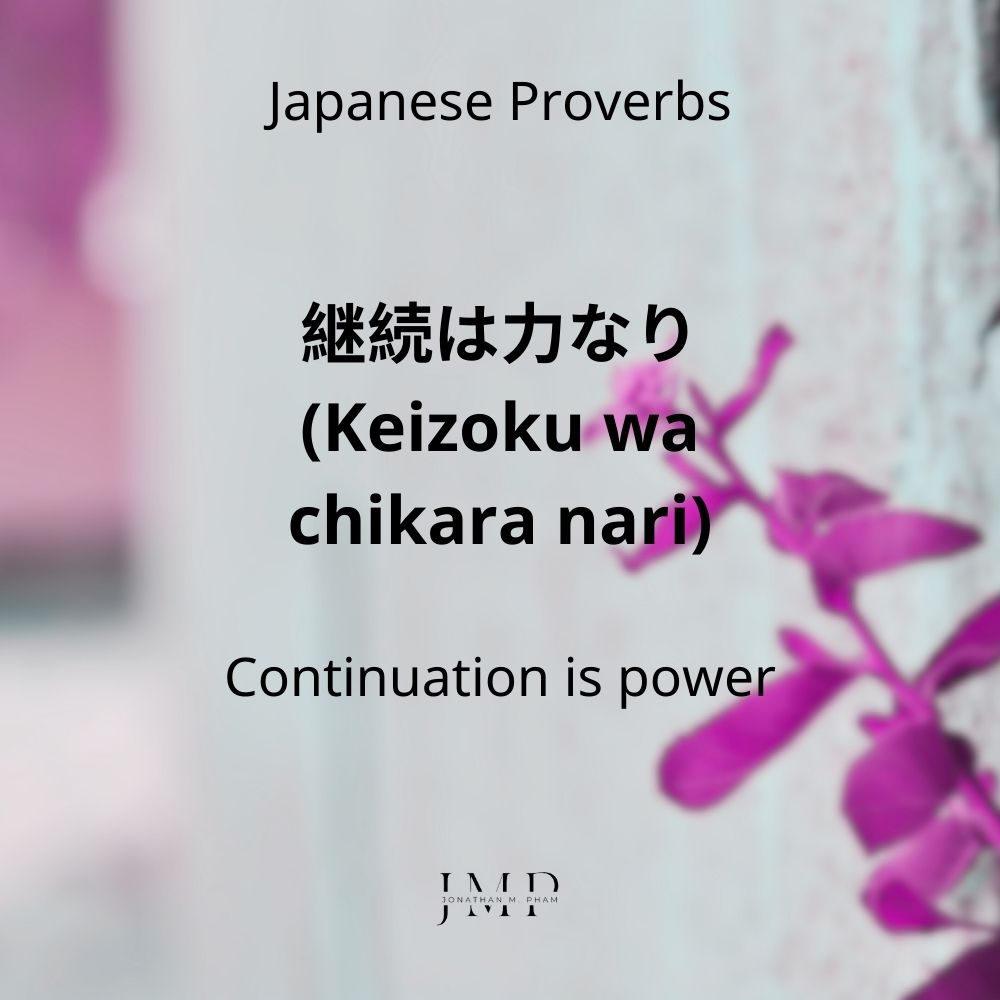
Japanese proverbs about strength
塵も積もれば山となる (Chiri mo tsumoreba yama to naru)
Literal meaning: “Even dust, when piled up, becomes a mountain.”
Seemingly insignificant efforts or savings, when accumulated, can lead to monumental results. In other words, we should never underestimate the value of a single step, a single coin, or a single kind act.
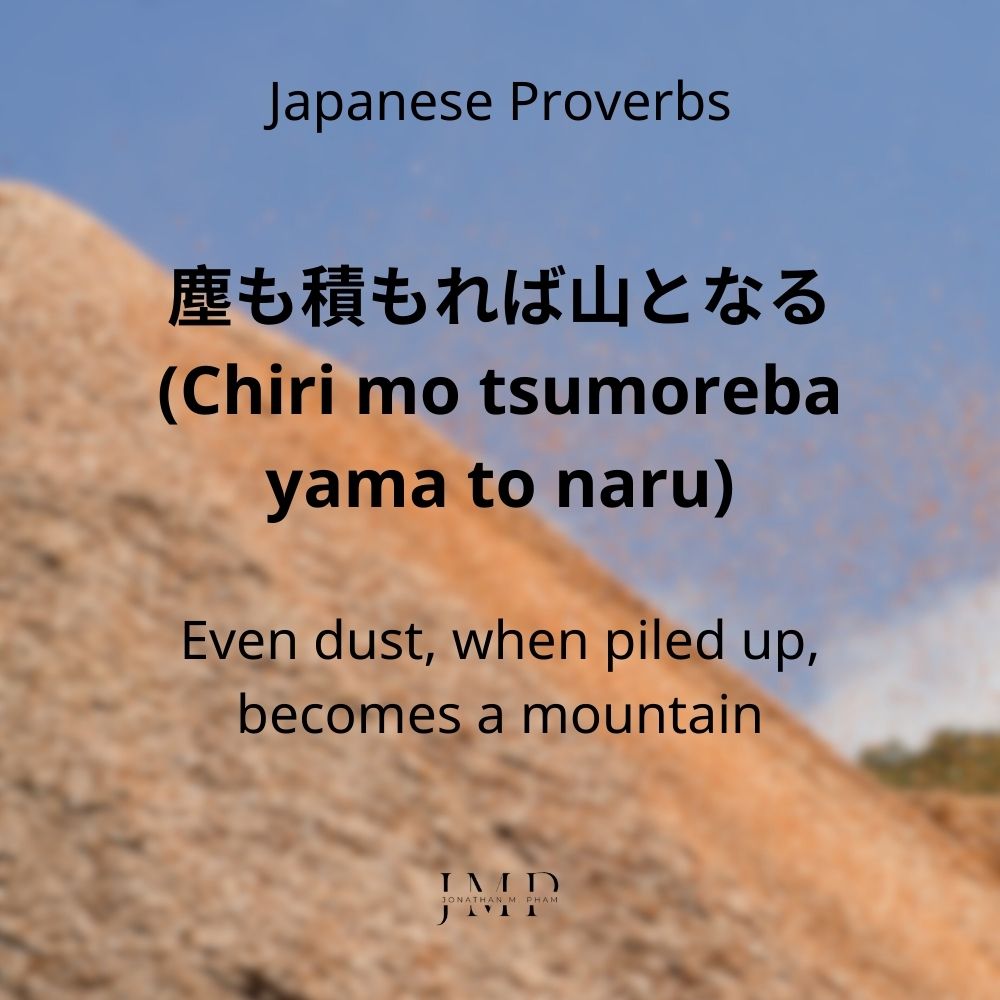
笑う門には福来たる (Warau kado ni wa fuku kitaru)
Literal meaning: “Fortune comes to those who smile.”
A cheerful and positive disposition attracts good things. People are drawn to warmth and happiness. By cultivating a positive atmosphere in one’s home and heart, one opens the door for good fortune and fulfilling relationships to enter.

苦あれば楽あり (Ku areba raku ari)
Literal meaning: “Where there is hardship, there is pleasure.”
Ease is sweeter after a period of difficulty. The two are intertwined. Knowing this allows one to better endure hard times, knowing that a period of relief will follow.
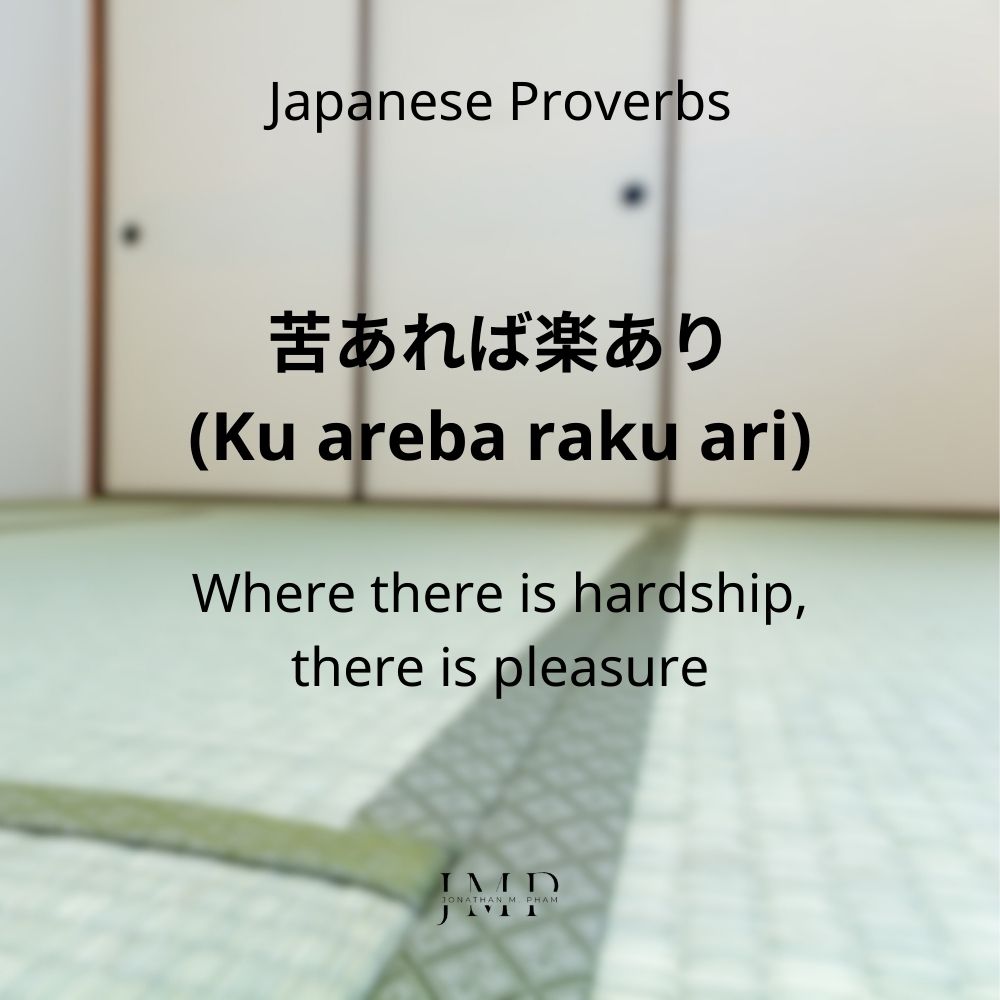
人事を尽くして天命を待つ (Jinji o tsukushite tenmei o matsu)
Literal meaning: “Do everything in your human power, and then wait for the decree of heaven.”
The perfect balance between effort and surrender. Give your absolute best to a task. Prepare, practice, and work diligently. Once you have done everything you possibly can, let go of the outcome and trust in the flow of life.
Read more: 57 Hope Quotes to Uplift Spirits & Brighten the Day
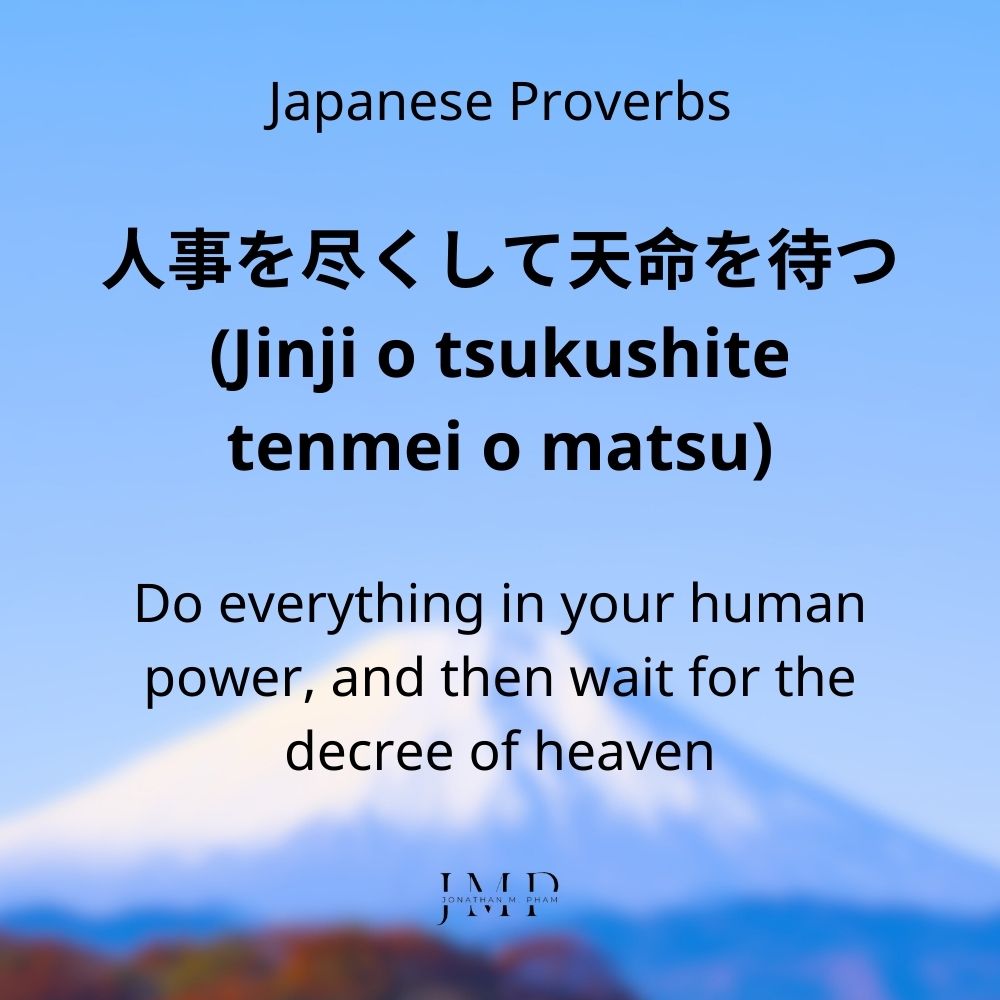
花は桜木、人は武士 (Hana wa sakuragi, hito wa bushi)
Literal meaning: “Among flowers, the cherry blossom; among men, the warrior.”
The cherry blossom is considered the finest flower, admired for its brilliant, transient beauty. Likewise, the samurai was seen as the ideal person, not merely for his skill in battle, but for his integrity, discipline, and courage to live with purpose. For us today, the “warrior” can be seen as the warrior of the spirit – one who lives authentically and aligns their actions with their core values.
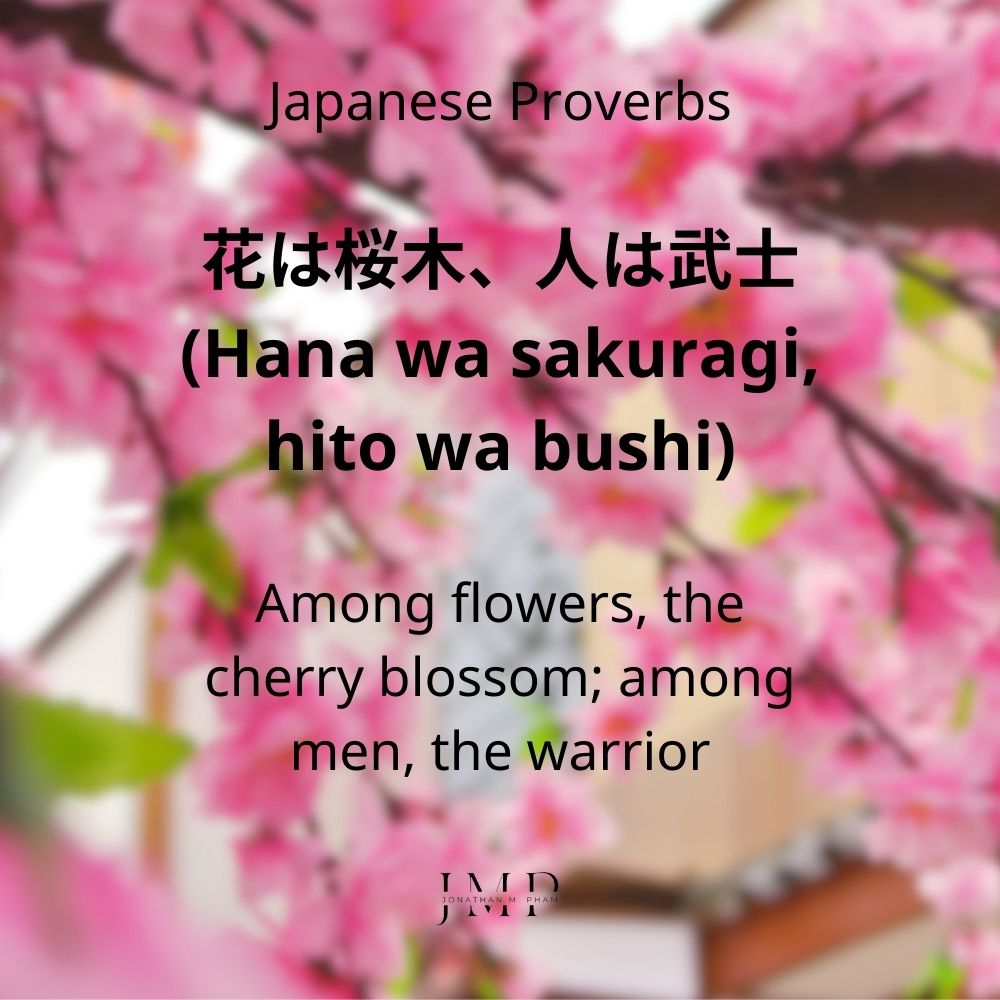
Japanese Samurai proverbs
Japanese Proverbs about Love & Relationships
情けは人の為ならず (Nasake wa hito no tame narazu)
Literal meaning: “Compassion is not for the sake of others.”
When you show kindness, it isn’t just the other person who benefits. That act of compassion circles back, enriching your own life and character. Helping others is a form of helping yourself.
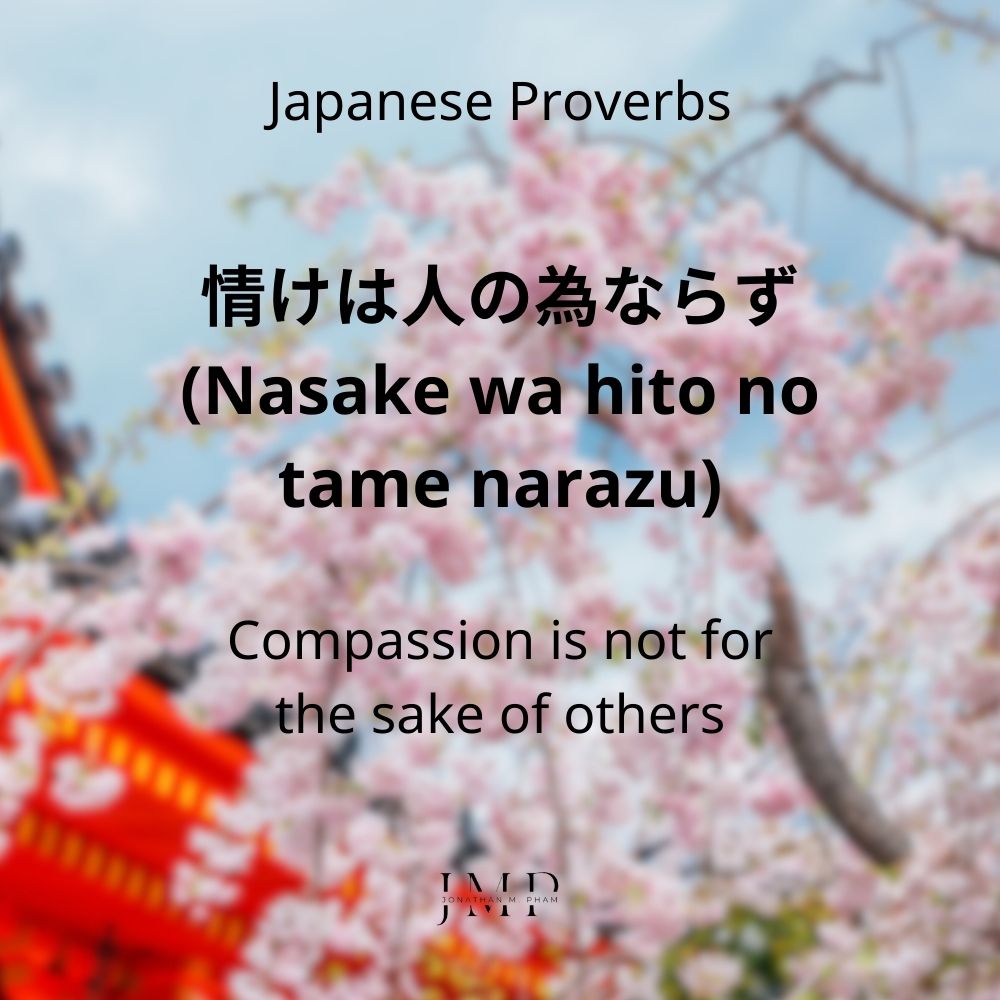
魚心あれば水心 (Uogokoro areba mizugokoro)
Literal meaning: “If the fish has a heart for the water, the water has a heart for the fish.”
Kindness begets kindness. When you approach someone with goodwill and sincerity, they are likely to respond in kind. Relationships are a reciprocal dance; what you offer is what you receive.
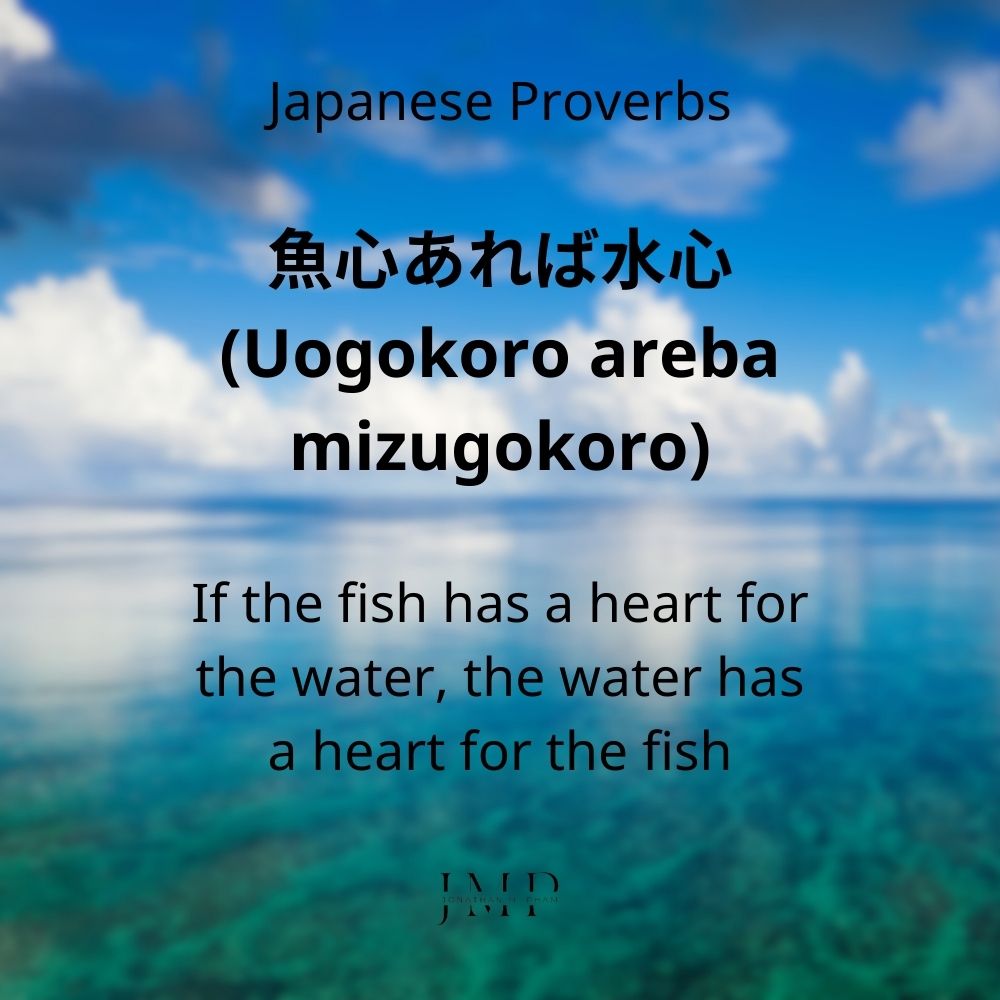
Japanese proverbs about friendship
可愛い子には旅をさせよ (Kawaii ko ni wa tabi o saseyo)
Literal meaning: “Send the beloved child on a journey.”
To truly love someone is to want them to grow, and growth requires experience and challenge. Sheltering a loved one from all hardship is a disservice. True affection is shown by giving them the freedom to face the world and cultivate their own strength.
Read more: 84 Unconditional Love Quotes for Every Soul
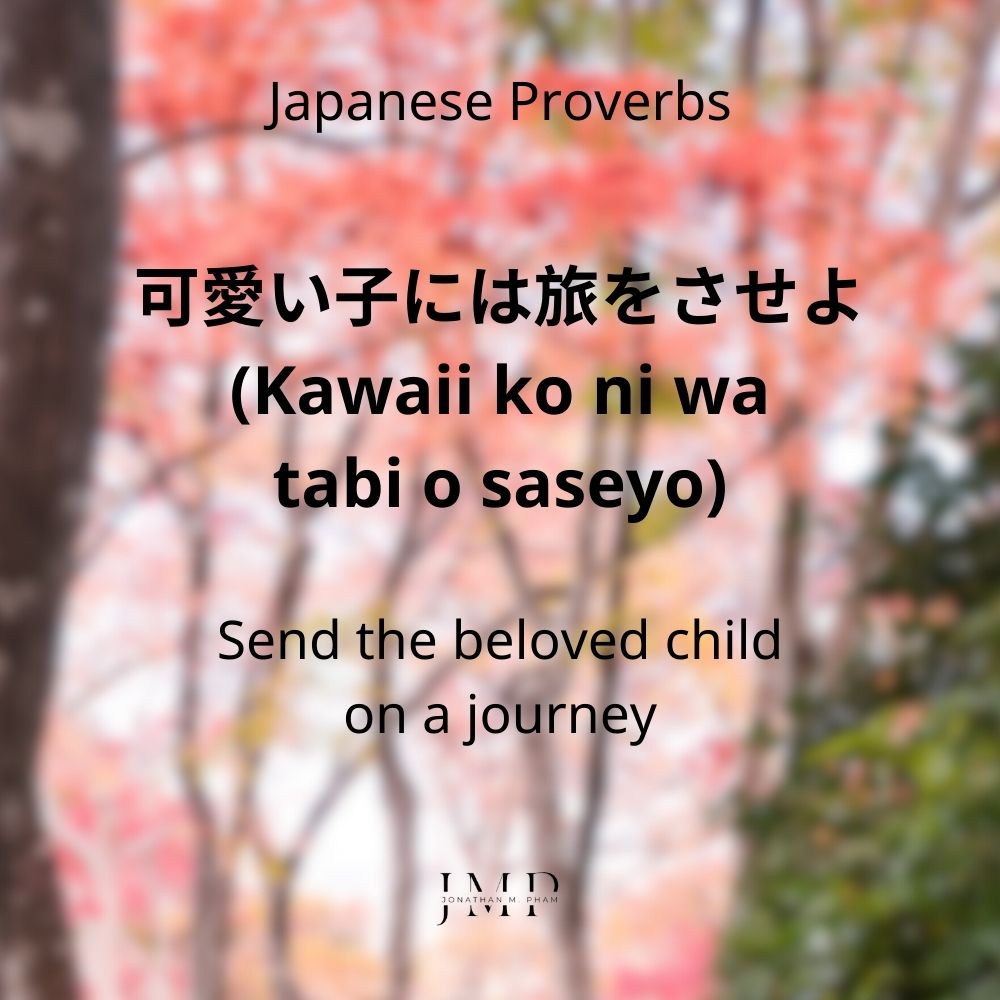
Japanese proverbs about family
花より団子 (Hana yori dango)
Literal meaning: “Dumplings over flowers.”
A seemingly humorous expression, yet it points to a practical truth: substance is more important than style. While aesthetics and beautiful gestures (“flowers”) are nice, what truly matters are the practical, sustaining things (“dumplings”). It’s a reminder to prioritize what genuinely nourishes you in life and relationships.
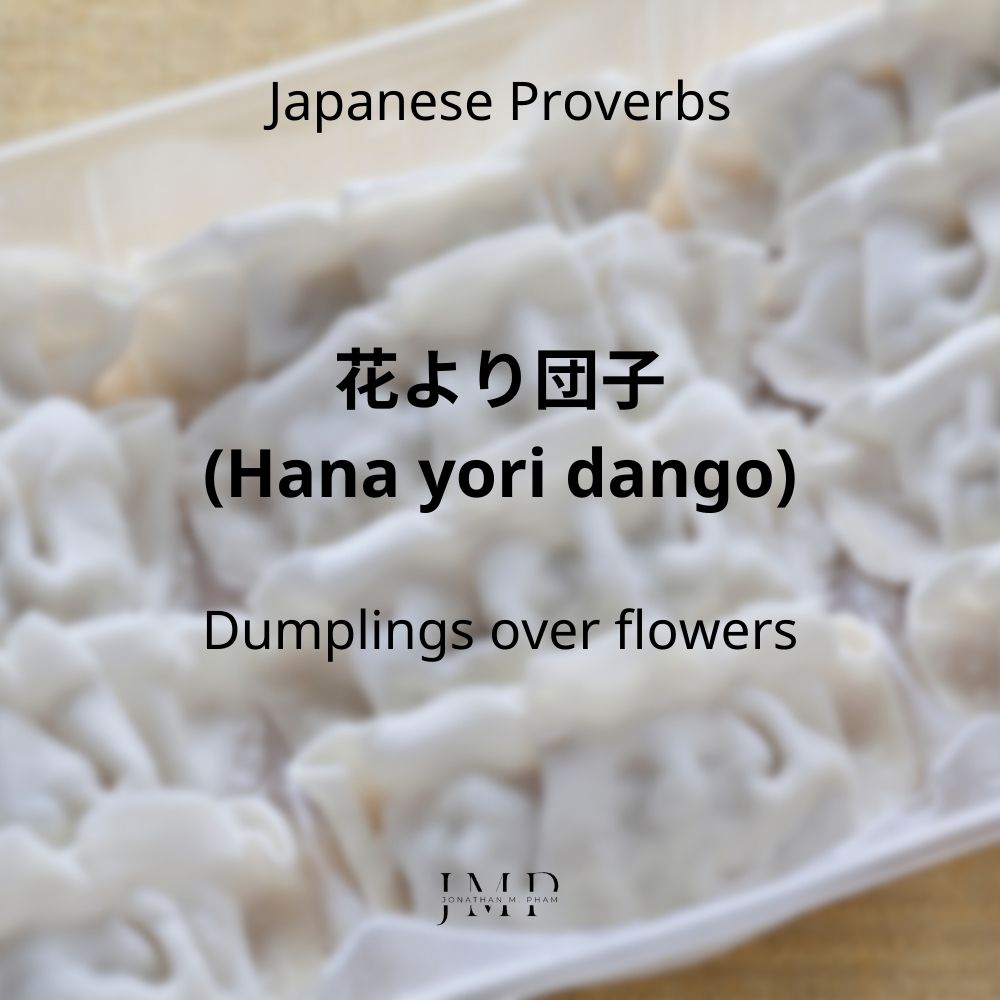
Japanese idioms
口は災いの元 (Kuchi wa wazawai no moto)
Literal meaning: “The mouth is the source of disaster.”
Words have immense power to create harmony or chaos. A thoughtless comment can cause irreparable damage. As such, we should do our best to speak mindfully, think before speaking, and value the wisdom of silence.
Read more: 80 Self Control Quotes – Your First & Greatest Triumph
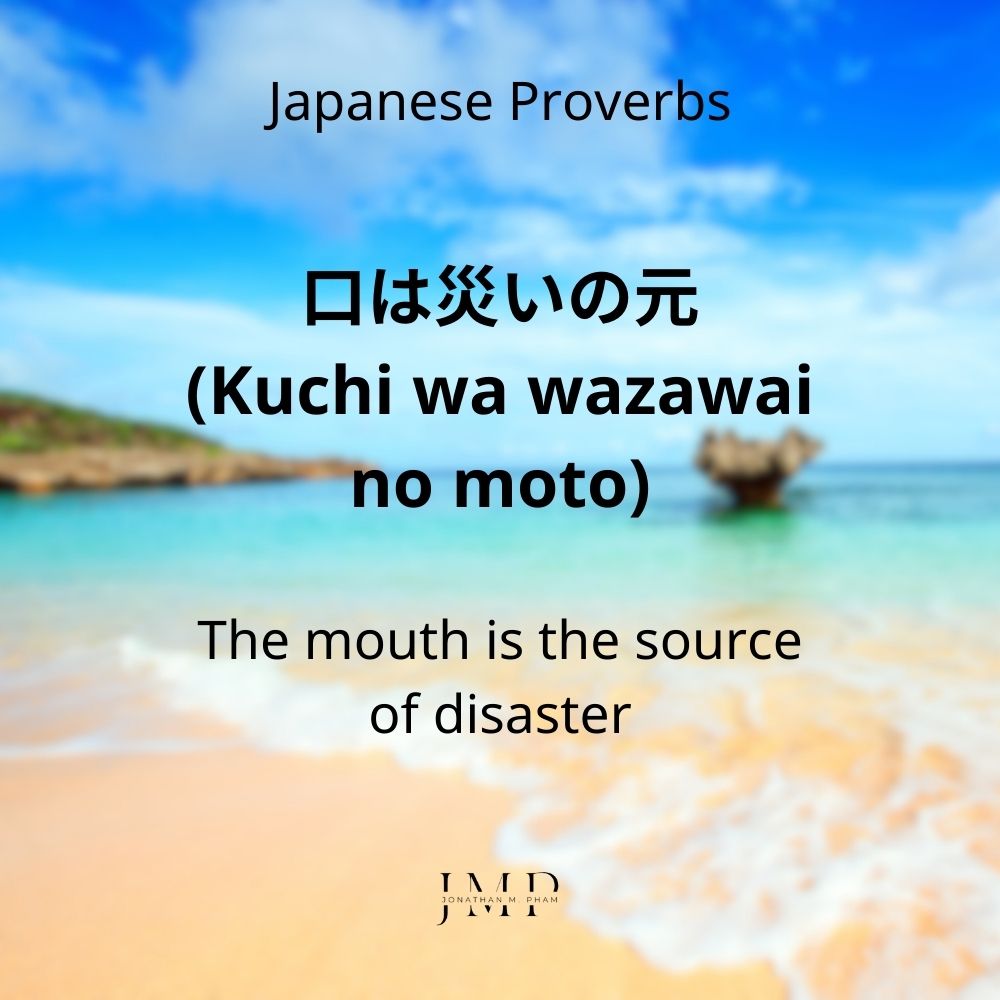
Japanese proverbs about anger
Japanese Proverbs on Learning & Self-Reflection
初心忘るべからず (Shoshin wasuru bekarazu)
Literal meaning: “Never forget the beginner’s spirit.”
When starting something new, one is humble, curious, and full of excitement – such open-minded spirit is what we call “beginner’s spirit (shoshin – 初心), and it is something we should carry throughout life. No matter how much of an expert you become, retaining a beginner’s mind keeps you open to learning and prevents arrogance.
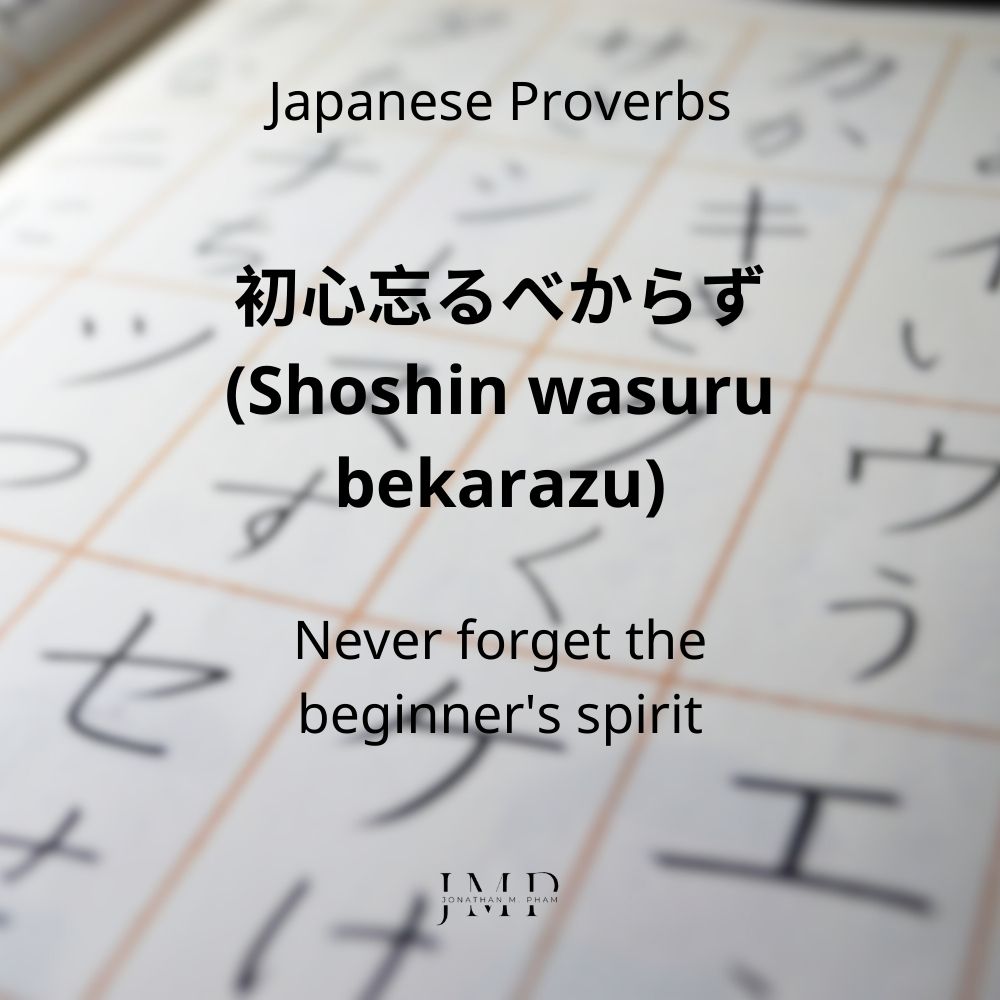
井の中の蛙 大海を知らず (I no naka no kawazu, taikai o shirazu)
Literal meaning: “A frog in a well knows nothing of the great ocean.”
One’s perspective is limited by one’s experience. Do not be complacent in a small world of your own making. Rather, be curious, explore beyond your comfort zone, and recognize that there is always more to learn and see.
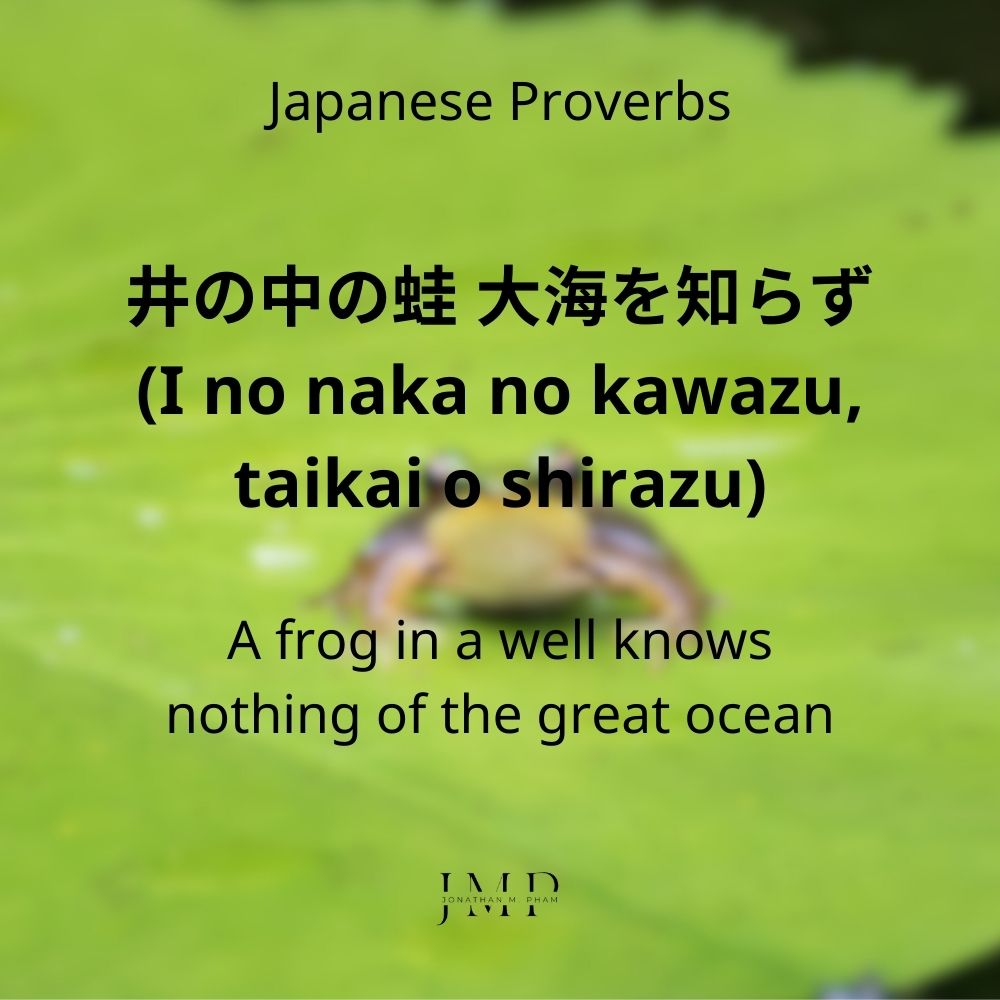
聞くは一時の恥、聞かぬは一生の恥 (Kiku wa ittoki no haji, kikanu wa isshou no haji)
Literal meaning: “To ask is a moment’s shame, but not to ask is a lifetime of shame.”
Feeling foolish for raising a question lasts only a moment. But the ignorance that comes from never asking can last a lifetime. Be courageous enough to admit when you don’t know something; that is the first step toward knowledge.
Read more: 75 Believe in Yourself Quotes – Trusting the Voice Within
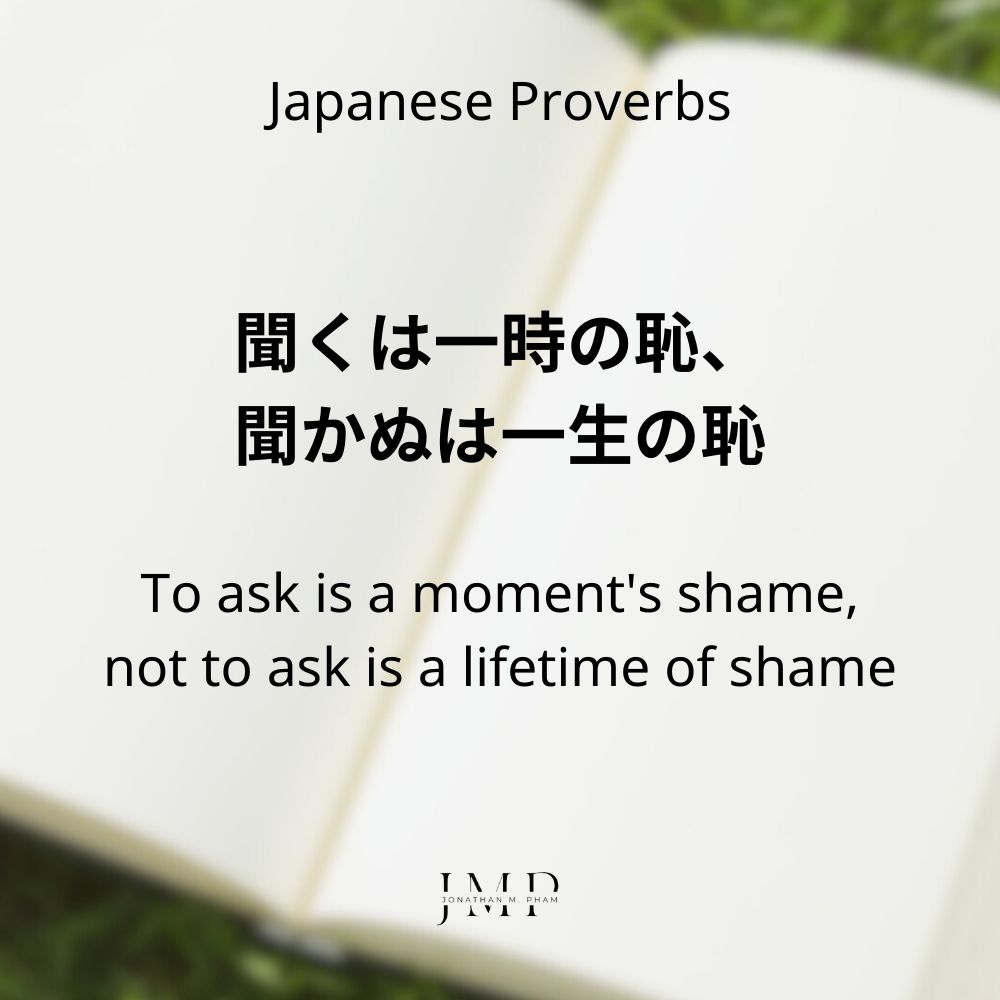
温故知新 (Onko chishin)
Literal meaning: “Review the old to know the new.”
There is immense value in reflecting on the past – our own experiences, history, and ancient wisdom. By understanding where we came from, we may be better equipped to navigate the future and innovate in meaningful ways.
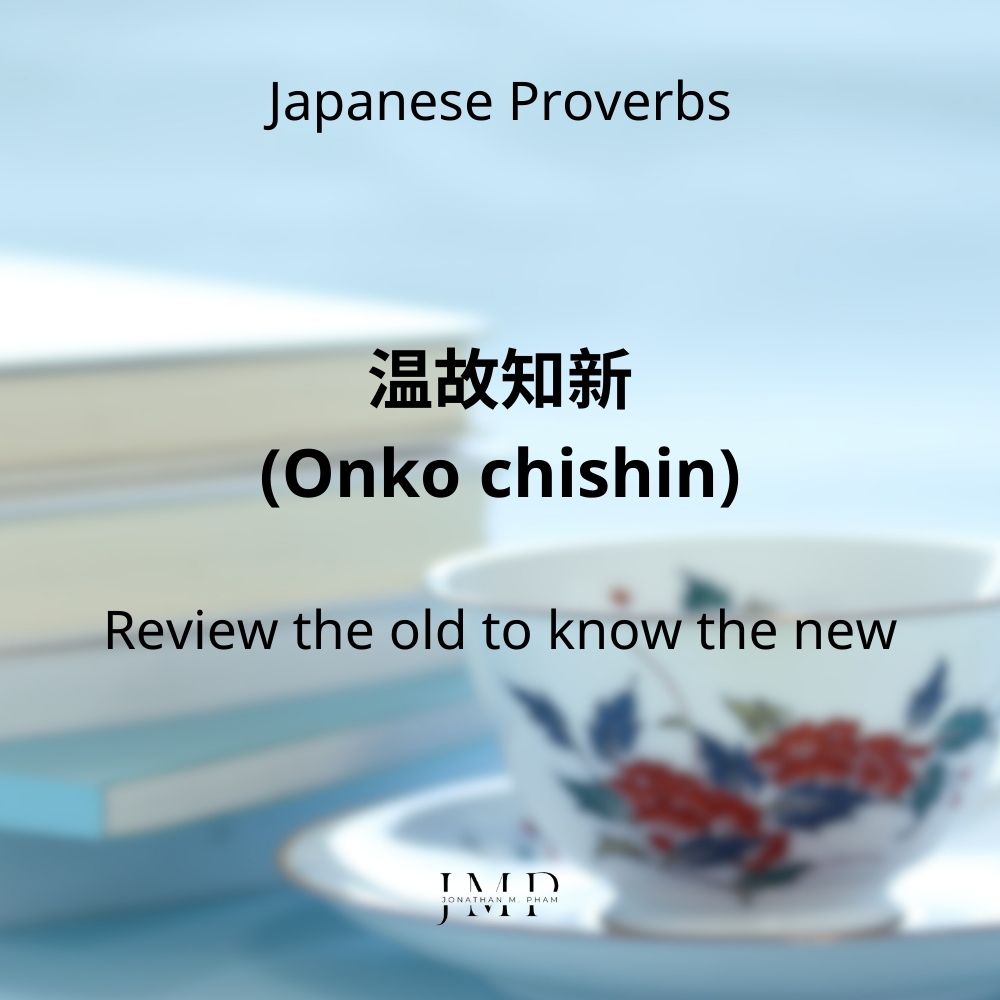
知らぬが仏 (Shiranu ga hotoke)
Literal meaning: “Not knowing is Buddha.”
Sometimes, “ignorance” truly is bliss. There are situations where knowing every detail only causes unnecessary anxiety and pain. Finding peace in “not knowing” (i.e. in accepting that you don’t have to carry the weight of every piece of information) is a form of enlightenment itself.
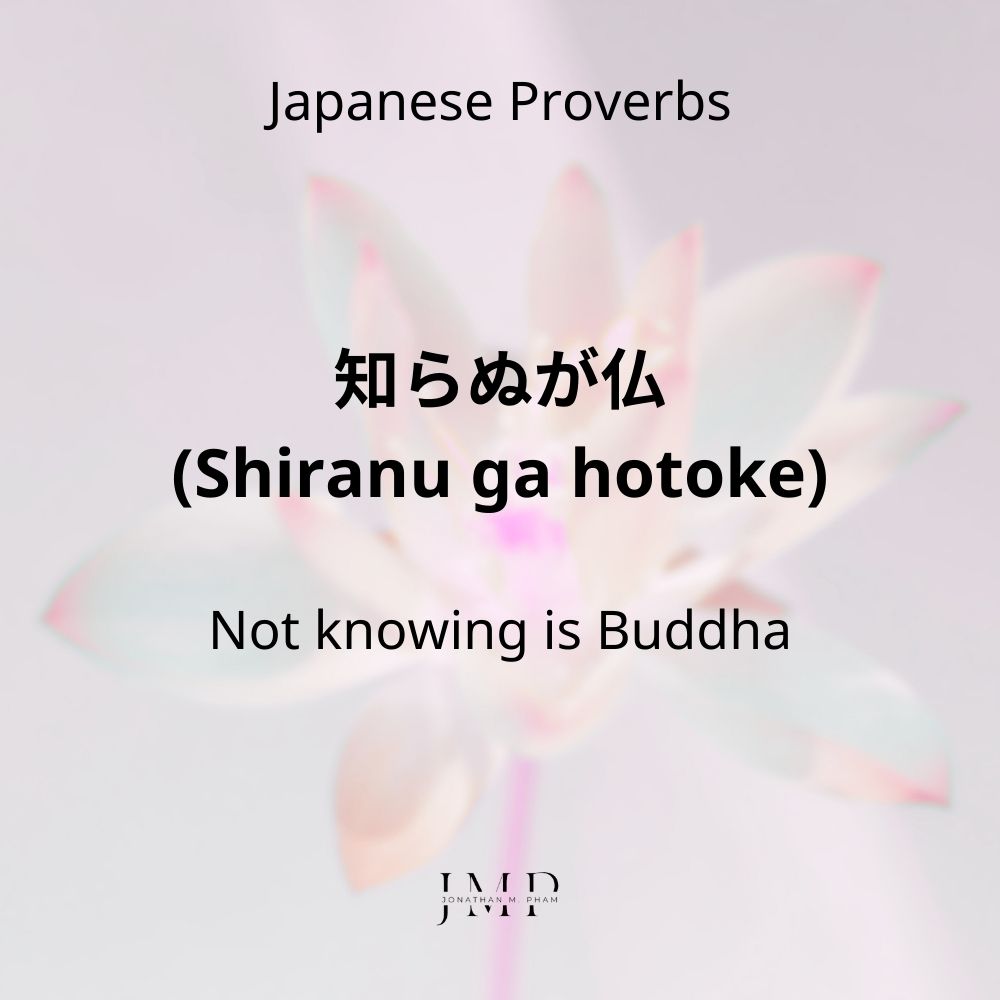
Wisdom japanese proverbs
三人寄れば文殊の知恵 (Sannin yoreba Monju no chie)
Literal meaning: “When three people gather, they have the wisdom of Manjushri (the Bodhisattva of wisdom).”
Even if each person is ordinary on their own, collaboration and shared brainstorming is key to producing extraordinary wisdom.
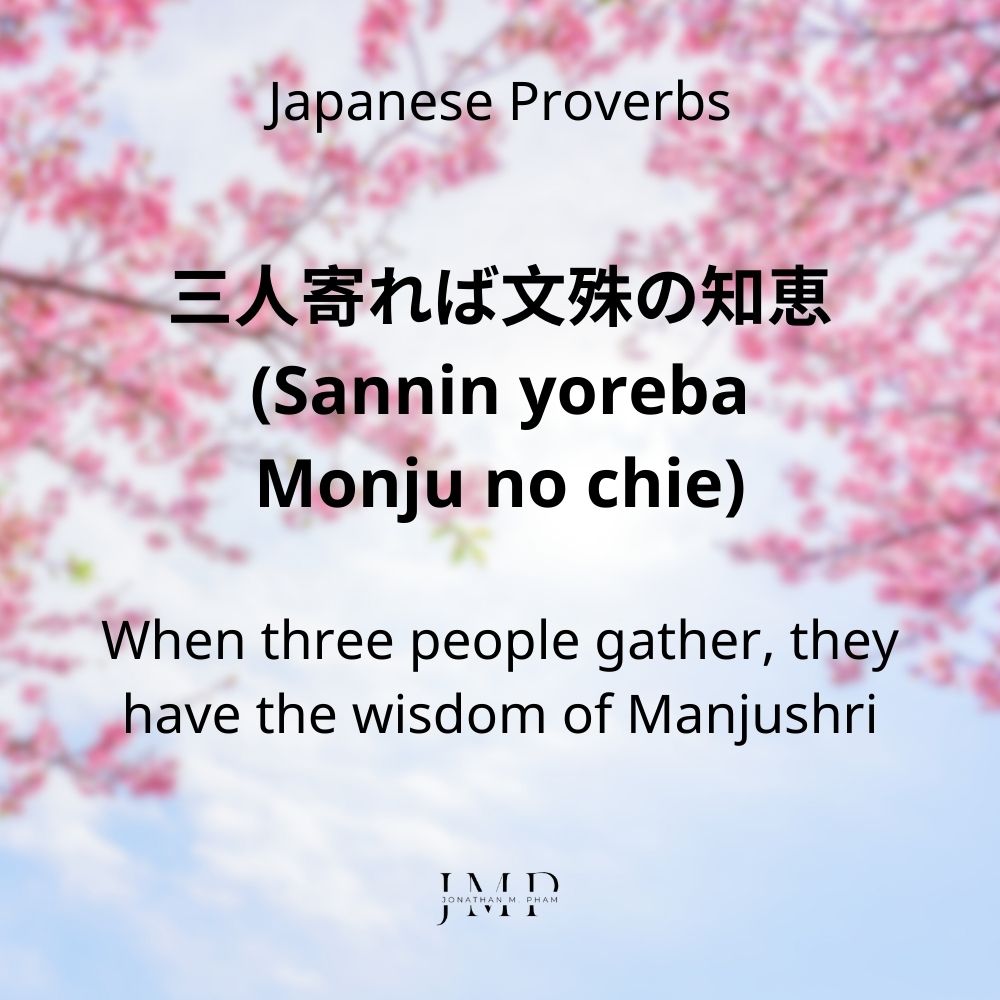
人のふり見てわがふり直せ (Hito no furi mite, waga furi naose)
Literal meaning: “Watching another’s behavior, correct your own.”
Every person you meet is a mirror. By observing the actions of others – both the admirable and the flawed – you can gain insight into your own conduct and find opportunities for self-improvement.
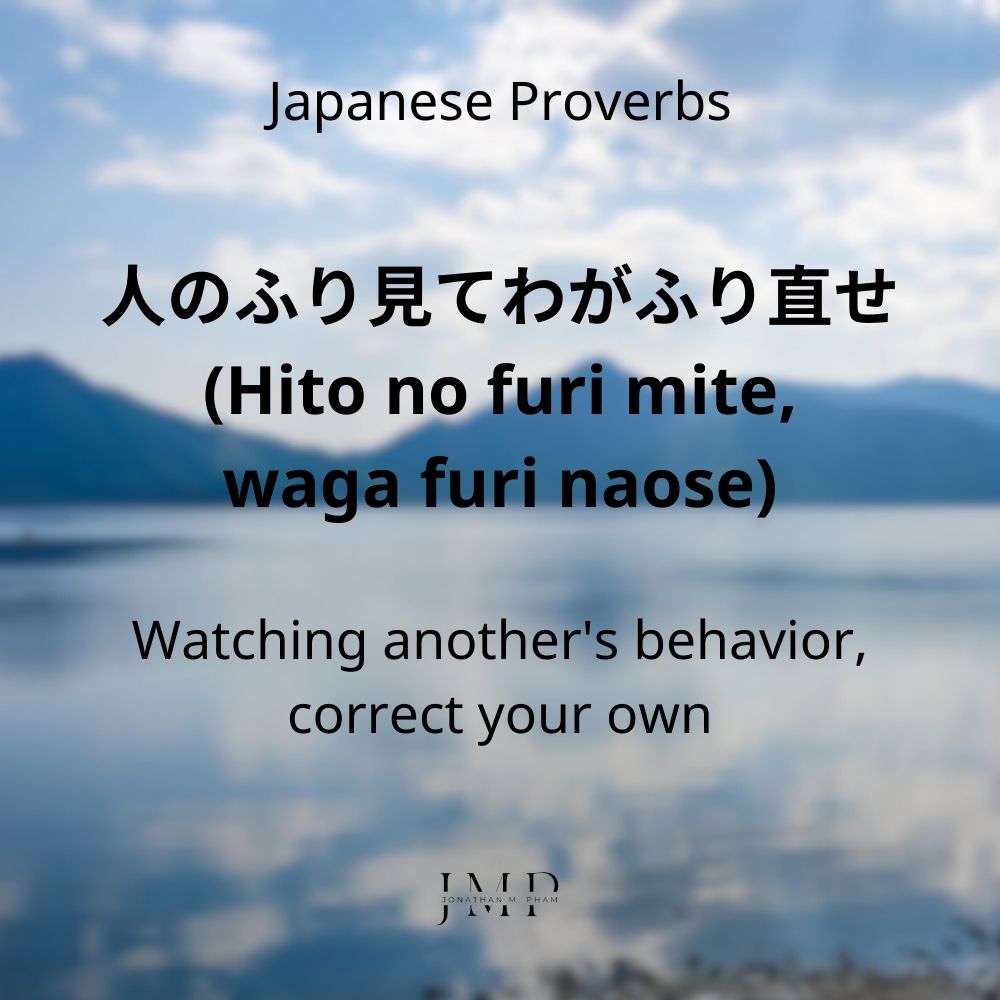
Japanese proverbs about work
桜梅桃李 (Oubai touri)
Literal meaning: “Cherry, Apricot, Peach, and Plum.”
Each of these trees blossoms in its own unique way and in its own time. Hence, there is no need for comparison. Appreciate your own unique qualities and trust in your own path, just as each tree fulfills its own nature.
Read more: 75 Self Love Quotes – The Art of Befriending Yourself
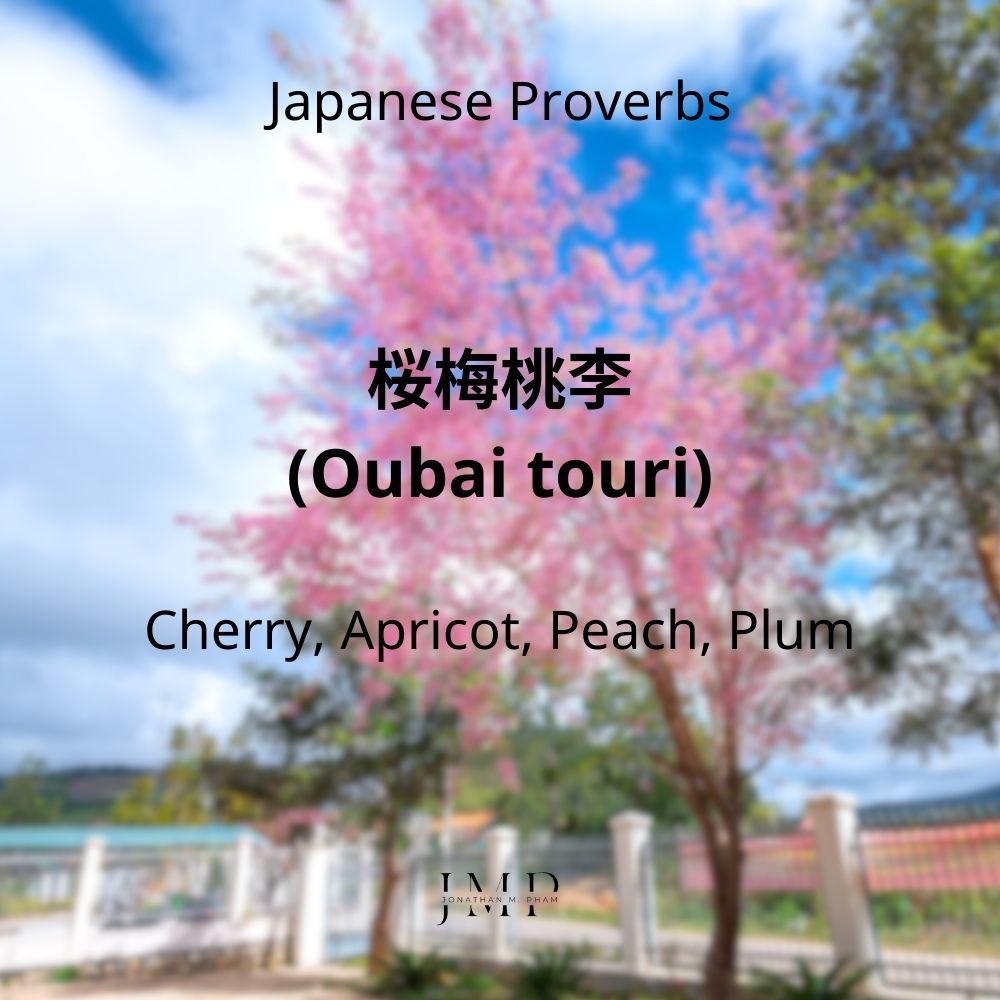
Japanese sayings with deep meaning
Japanese Proverbs on Action & Caution
出る杭は打たれる (Deru kui wa utareru)
Literal meaning: “The nail that sticks out gets hammered down.”
A famous and complex piece of cultural wisdom. On one hand, it speaks to the value of social harmony and the potential friction that comes from standing out too much. On the other, it can be seen as a challenge: if you choose to be different or to innovate, be aware of the resistance you may face – and be prepared with strength and conviction.
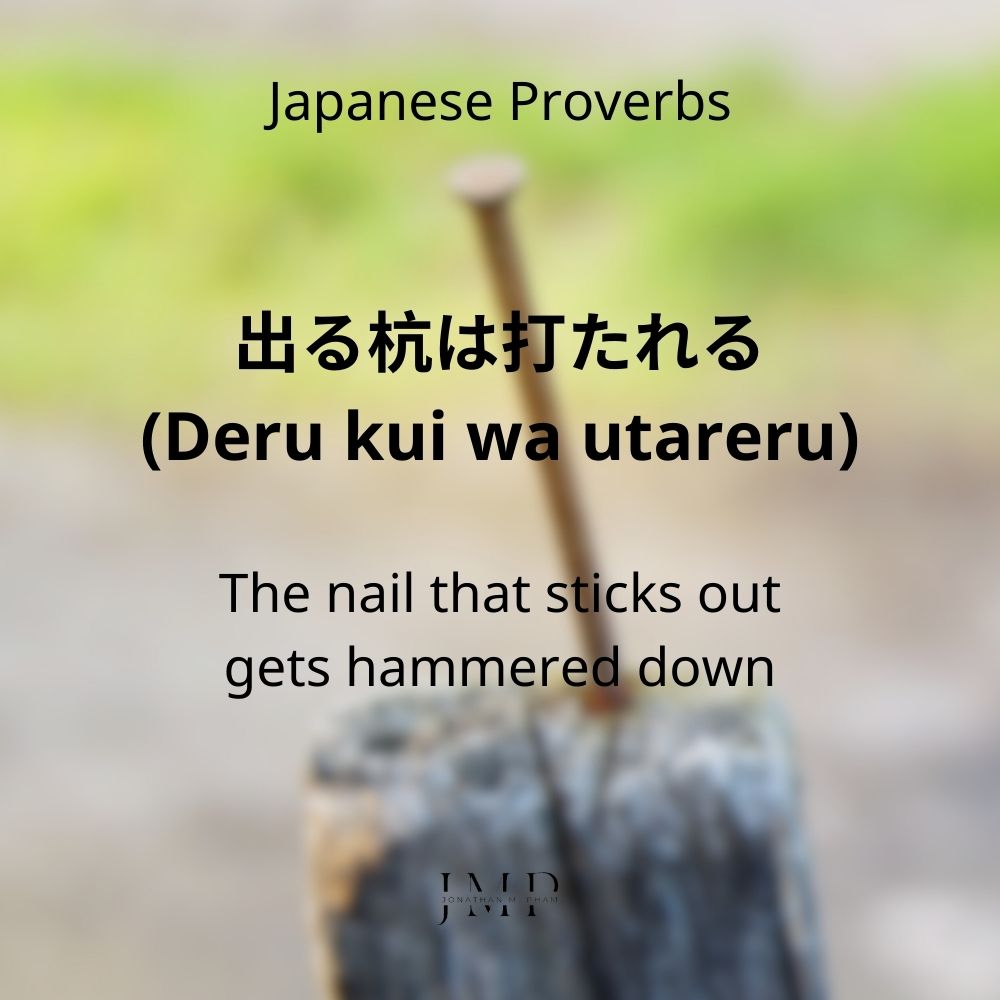
二兎を追う者は一兎をも得ず (Nito o ou mono wa itto o mo ezu)
Literal meaning: “One who chases two rabbits will catch neither.”
Focus is essential for success. If you divide your energy and attention between too many goals at once, you risk achieving none of them. Pick your target wisely, and give it your full concentration.
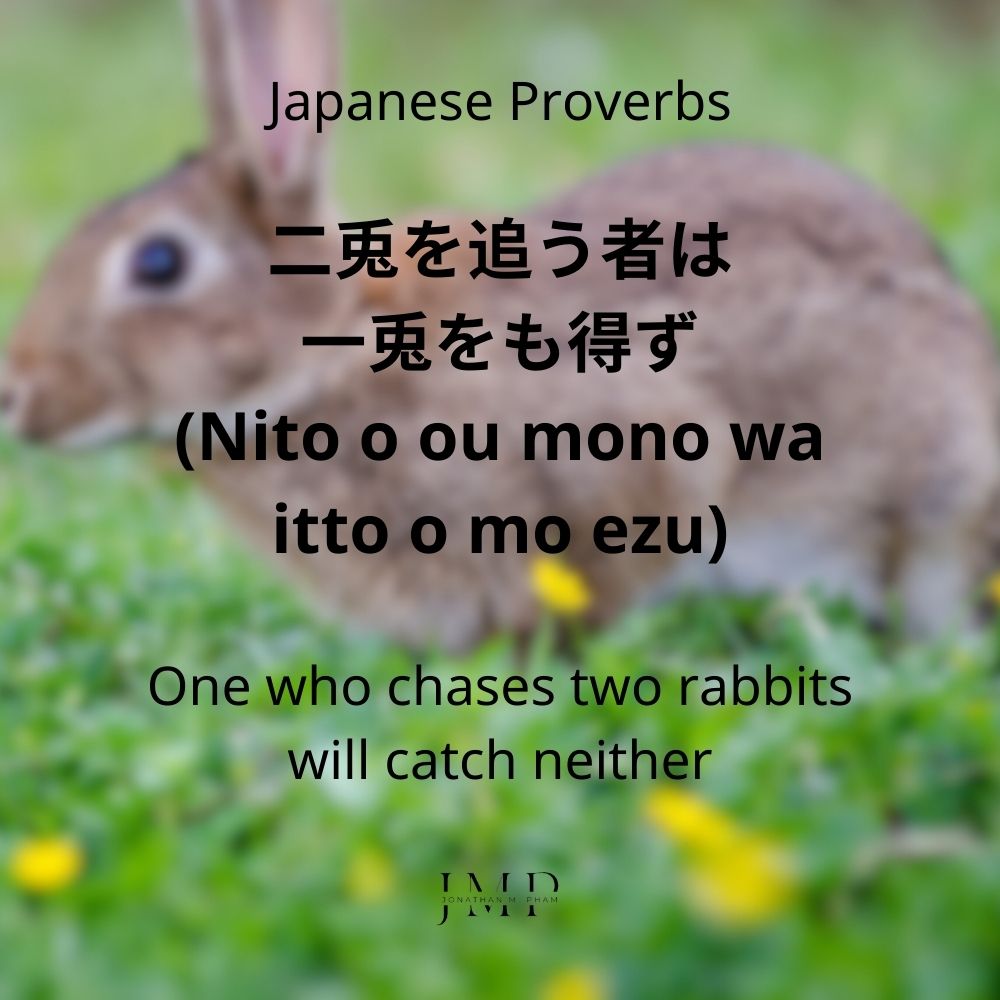
虎穴に入らずんば虎子を得ず (Koketsu ni irazunba koji o ezu)
Literal meaning: “If you do not enter the tiger’s den, you will not catch its cub.”
Nothing ventured, nothing gained. Great rewards require taking great risks. You cannot achieve extraordinary things from a position of absolute safety. To get what you want, you must have the courage to face your fears and enter the “tiger’s den.”
Read more: 50 Facing Fears Quotes – Unleash the Power Within
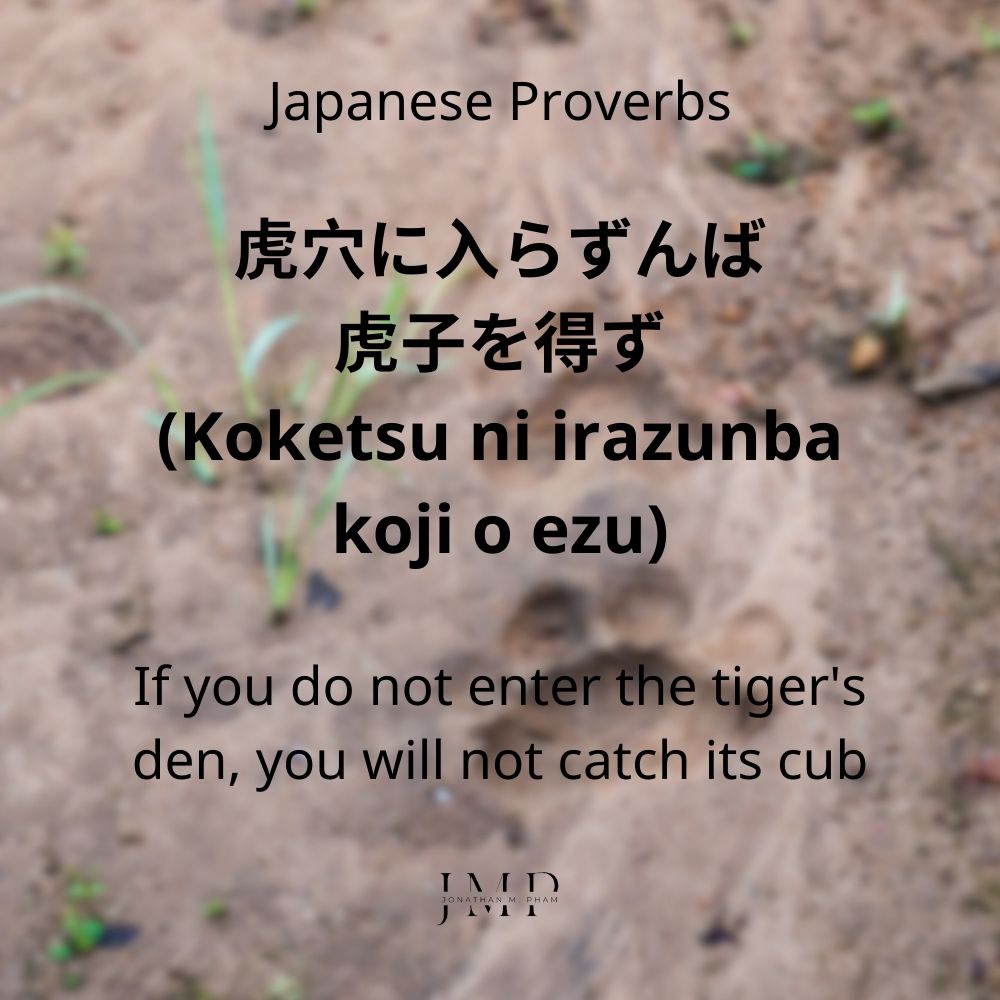
石橋を叩いて渡る (Ishibashi o tataite wataru)
Literal meaning: “Tap a stone bridge before crossing it.”
Even when a path seems perfectly safe and secure – like a bridge made of stone – it is wise to proceed with caution and due diligence. A little extra care can prevent a major disaster. It’s the perfect balance to the boldness of entering the tiger’s den.

二度あることは三度ある (Nido aru koto wa sando aru)
Literal meaning: “What happens twice, will happen a third time.”
A one-time event may be an accident; however, a second occurrence is likely to suggest a trend or pattern. Whether for good or for ill, be prepared for a third instance. It’s a prompt to either take preventative action or to ready oneself for a recurring opportunity.
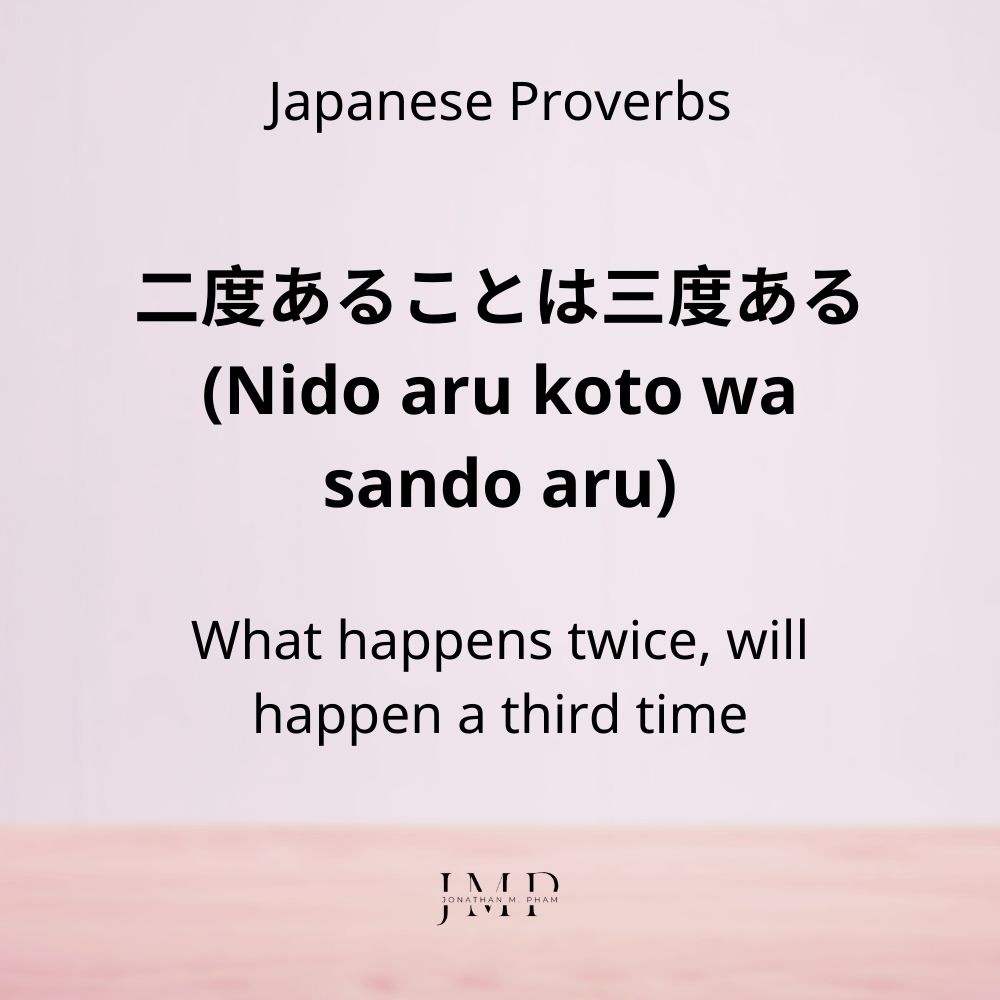
Funny Japanese Proverbs
蛙の子は蛙 (Kaeru no ko wa kaeru)
Literal meaning: “The child of a frog is a frog.”
A lighthearted observation that children tend to inherit the traits and habits of their parents. It’s a humorous way of saying “the apple doesn’t fall far from the tree,” often said with a knowing, affectionate smile when someone acts just like their mother or father.
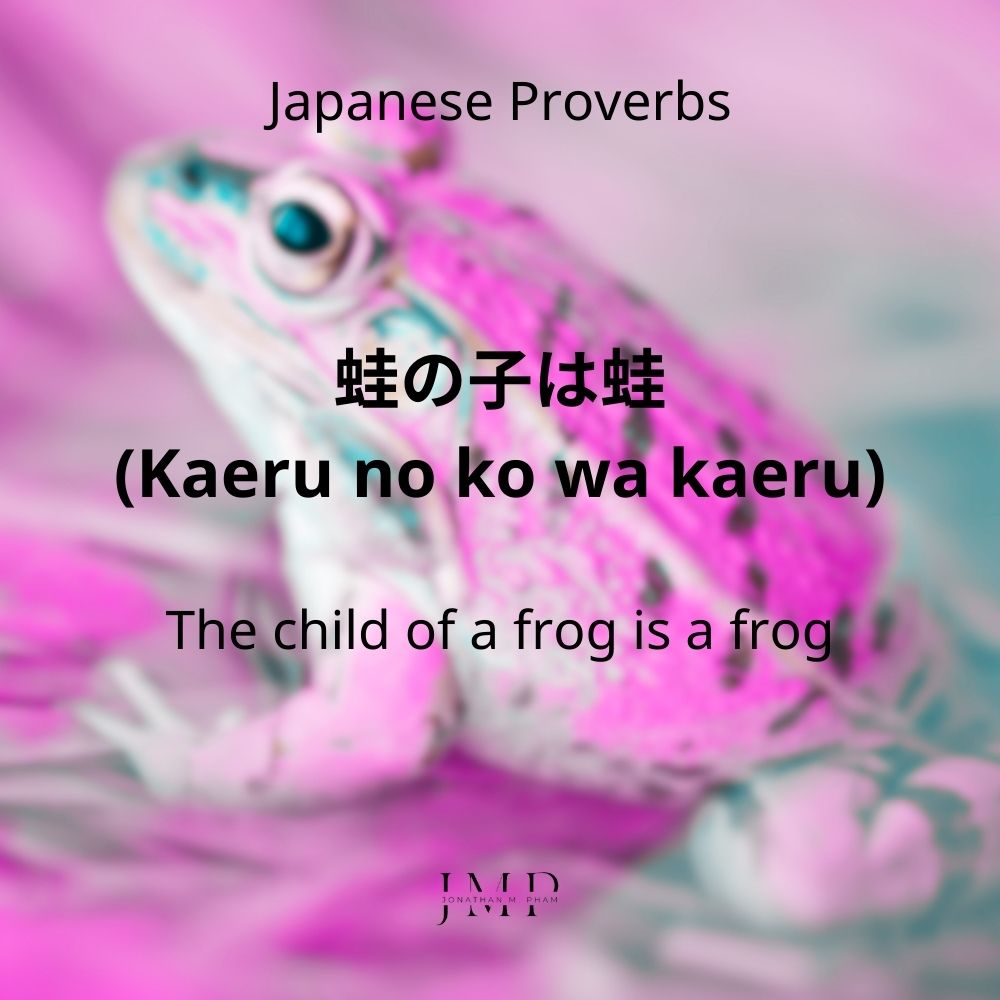
猫に小判 (Neko ni koban)
Literal meaning: “Gold coins for a cat.”
Giving a valuable gift to someone who cannot appreciate its worth is a waste.
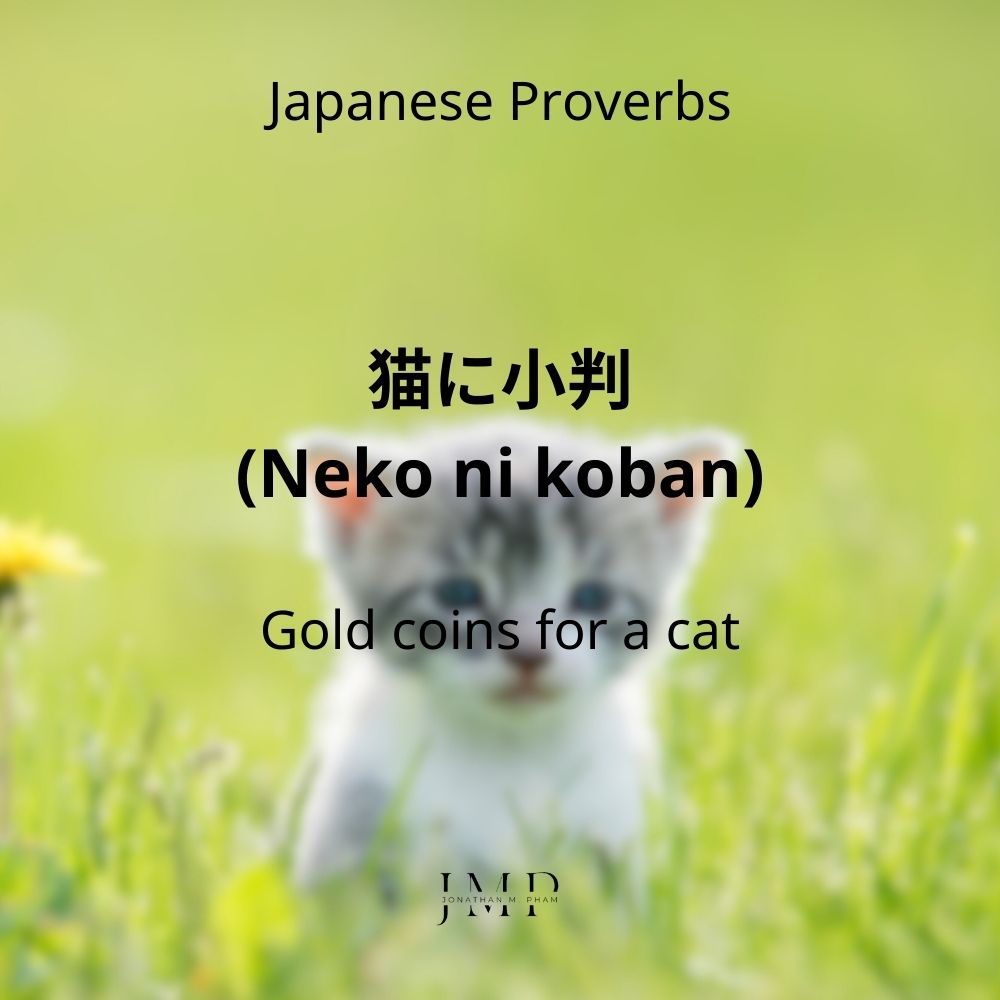
来年のことを言うと鬼が笑う (Rainen no koto o iu to oni ga warau)
Literal meaning: “If you speak of next year, the demon will laugh.”
The future is so unpredictable that making firm plans for it is almost an absurd idea. In other words, we need to wholeheartedly embrace the uncertainty of life – and be humble enough to never become so attached to our assumptions about what lies ahead.
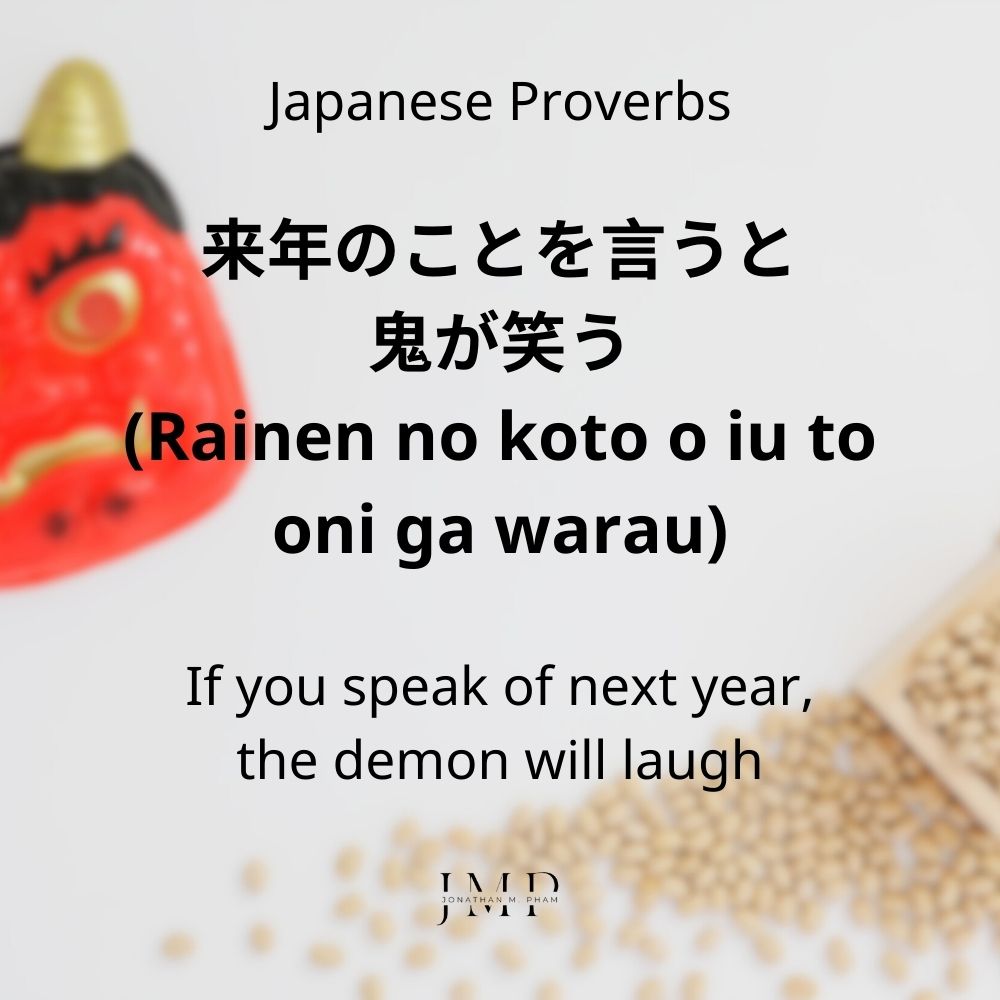
馬鹿は風邪を引かない (Baka wa kaze o hikanai)
Literal meaning: “Fools don’t catch colds.”
A classic piece of folk humor. The idea is that fools are too dense or too carefree to be bothered by something like a cold.
Sometimes, as it turns out, being a little less concerned about things can lead to a more robust, or at least a less-noticed, state of well-being.

Inspiring Japanese motivational quote
Final Thoughts
And so, our journey comes to an end!
Perhaps as you were reading, you might have found one of the Japanese proverbs above quietly resonating with you. For example, did the firmness of the ground after rain, or the simple courage to get up an eighth time speak to something within you?
If so, I invite you to take that one proverb and carry it with you this week. Write it on a small note and place it where you’ll see it. Let it be a companion, a gentle reminder. See how it might shift your perspective, soften your heart, or strengthen your resolve in small, meaningful ways!
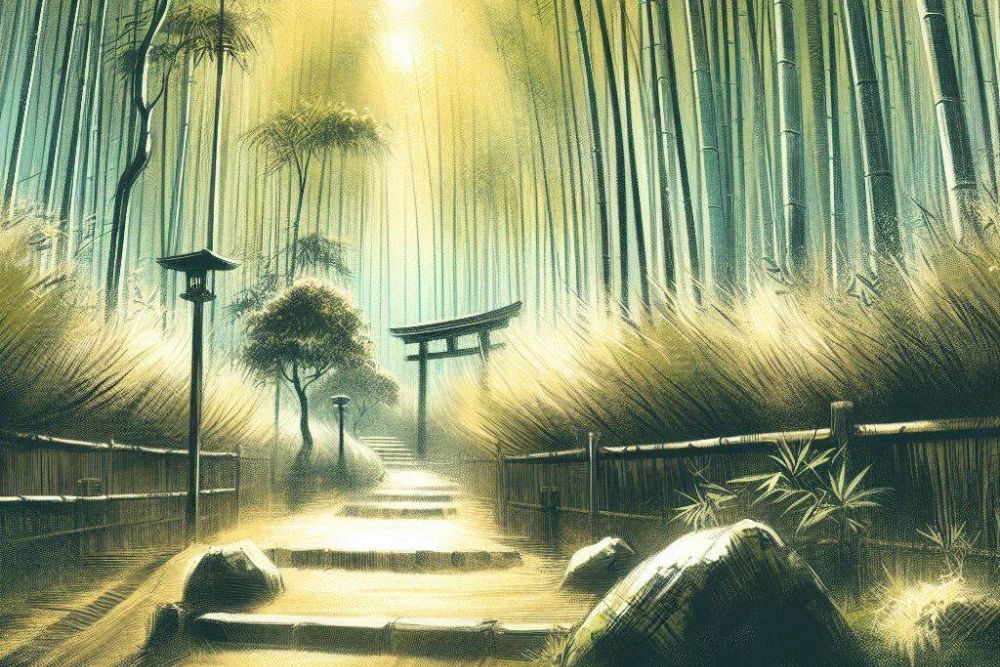
Other resources you might be interested in:
- 20 Japanese Philosophies of Life to Live by Everyday
- Ikigai (生き甲斐): Discovering Your Reason for Being
- 82 Ikigai Quotes: Find Your Reason for Being
Let’s Tread the Path Together, Shall We?


